Open Calls for Papers, Proposals, and Applications
Calls for papers .
Economics of Artificial Intelligence: Political Economy Challenges (call closes June 1, 2024)
Megafirms and the Economy (call closes June 15, 2024)
Information and Competition in the Digital Economy (call closes July 1, 2024)
Economics of Mobility (call closes July 18, 2024)
Competition in the US Agricultural Sector (call closes September 3, 2024)
Economics of Talent (call closes September 11, 2024)
Digital Platforms: Competition and Regulation (call closes September 12, 2024)
Energy Markets, Decarbonization, and Trade (call closes October 16, 2024 )

Calls for Proposals
Market Frictions and Financial Risks (Call closes May 21, 2024)
The Mercury Project The Mercury Project: 2023 Call for Proposals
In Fall 2021, the Social Science Research Council launched the Mercury Project , mobilizing social and behavioral scientists in a search for cost-effective and scalable solutions to build vaccination demand and healthier information environments.
With $25M in funding from The Rockefeller Foundation, Robert Wood Johnson Foundation, Alfred P. Sloan Foundation, Craig Newmark Philanthropies, and the National Science Foundation, the teams in the Mercury Project consortium are evaluating a portfolio of interventions in 17 countries that vary in settings, target populations, and risk/reward ratios, with the goal of identifying those interventions that most cost-effectively and scalably increase science-based health decision making.
We are excited to announce a new call for proposals with funding from the Bill & Melinda Gates Foundation. The Mercury Project now invites proposals to evaluate the causal impacts of online or offline interventions designed to increase demand for vaccinations consistent with national priorities, including childhood vaccines, HPV, polio, measles, and Covid-19 vaccinations, in low- and lower-middle income countries in Africa, Asia, and Latin America and the Caribbean.
Applicants are encouraged to consider the Mercury Project’s Research Framework in developing proposals. Preference will be given to projects that:
- evaluate the effects of interventions on behavioral outcomes, including vaccination uptake;
- evaluate interventions that are designed and delivered in collaboration with governmental, NGO, and/or corporate partners;
- have demonstrated potential to be cost-effective at scale;
- include researchers and research institutions located in the countries in which the study is being conducted.
Proposed projects may have a duration of up to 30 months. Primary applicant organizations must be tax-exempt organizations or the equivalent in the local context (e.g., nonprofit organizations, universities, governmental units). Proposed budgets should be appropriate to cover project costs, with indirect costs not exceeding 15% of direct costs.
Proposals will undergo confidential peer review by a panel of scientific experts. Proposals will be evaluated on the basis of scientific merit, potential to cost-effectively increase vaccination demand at scale, and research team inclusivity. Proposals will be reviewed on a rolling basis; we encourage applicants to submit proposals earlier rather than later. Applications will not be accepted after May 1, 2023.
Proposal Requirements
Applicants will be asked to provide the following information through the Mercury Project application portal.
- Identities of primary applicant organization and any proposed subaward organizations, including organizations’ tax-exempt (or equivalent) status;
- Identities of principal and co-investigators, including disciplinary and institutional affiliations, links to investigator websites or CVs, and contact information for principal investigator;
- Project description, including intervention design, proposed strategy to make causal inferences (e.g., randomized controlled trial or quasi-experimental design), potential causal mechanisms, sample size and power analysis, outcomes of interest, evidence for likely cost-effectiveness at scale, project duration and timeline, discussion of ethical considerations (6 pages maximum);
- Letters of collaboration from implementing partners;
- Project budget and budget narrative, with indirect costs not exceeding 15%.
Mercury Project Research Consortium
Grantees will be expected to participate in the Mercury Project research consortium, including regular monthly virtual research team meetings, at least one in-person convening of grantees and other invited parties, and the development of research and policy briefs written for policy impact. Additional funding for these activities will be provided by the Mercury Project.
If you have questions, please review the FAQ page . Please note that we cannot review materials in advance of submissions. For further questions not addressed in the FAQs, please contact [email protected] .
Privacy Overview
- भारत सरकार GOVERNMENT OF INDIA
- विज्ञान और प्रौद्योगिकी मंत्रालय MINISTRY OF SCIENCE AND TECHNOLOGY
- Screen Reader Access

Search form

विज्ञान एवं प्रौद्योगिकी विभाग

- Home >>
- What's New >>
- Call for Proposals >>
- Acts & Orders
- Announcement
- Awards/Prize/Result
- Call For Proposals
- Geospatial Policy/ Services
- International Cooperation Calls/Announcements/Results
- Monthly Achievements
- OMs and Guidelines
Call for Proposals
Archive Call For Proposals
Related Organization
Miscellaneous.

Browser does not support script.
- Opportunities
- Research Students
- Publications
- 25 Years of HO

Call for Research Project Proposals 2022-23
In 2018 the hellenic observatory launched an exciting research initiative to further fulfil and develop its mission and study of contemporary greece in the field of the social sciences. the programme became possible due to new funding granted for the specific purpose of furthering the hellenic observatory’s research agenda. the hellenic observatory would like to acknowledge grateful and sincere thanks to the a.c. laskaridis charitable foundation (aclcf) and dr vassili g. apostolopoulos for the provision of funding for this purpose. , research themes & level of awards.
The LSE’s Hellenic Observatory (HO) announced a new round of research project funding on January 2022. In line with the HO’s mission to promote high-quality social science research on contemporary Greece, this round of the scheme would fund up to three projects on three Research Themes (see below). Under each of these themes, applicants could submit proposals lasting 24 months (with a budget of up to GBP£20,000) or 12 months (with a budget of up to GBP£8,000). The HO reserves the right to adjust the length and level of any award.
The Hellenic Observatory would like to acknowledge grateful and sincere thanks to the A.C. Laskaridis Charitable Foundation (ACLCF) and Dr Vassili G. Apostolopoulos for the provision of funding for this Research Call.
Applications were invited for projects that address one of the following Themes:
Political and Social Mobilisation in Greece in Response to the ‘Migration Crisis’
Over the last decade, Greece has witnessed exceptionally high numbers of migrants entering the country as refugees or asylum-seekers. This has represented something of a systemic-shock, as successive governments, wider society, and the European Union have struggled to manage and accommodate the flows of people. Developments have seen great shifts in the migration landscape, whether this is related to refugee reception, migrant integration or the control of borders and migration deterrence. This has encouraged the proliferation and diversification of actors, actions, and mobilization processes involved in migration. The HO invited projects that aim to examine these developments by exploring how migration-focused mobilization is related to wider political dynamics. We invited research projects that would explore one or more of the following issues:
- Variations in the levels or types and impacts of mobilisations between locations (e.g. across similar local communities facing comparable challenges; or similarities in mobilisations across different areas)
- The nature and impact of such mobilisation across Greece and its implications for wider political and/or social engagement
- Linkages between local, national and EU mobilisations and the significance of such linkages for social and/or political activity within Greece
There was no expectation that applicants should necessarily address more than one of these issues. The research question and its significance should be clearly elaborated. There was no preferred methodology, and we invited project proposals that would be framed within one or more social science disciplines. Projects were expected to contribute to conceptual understanding, enabling cross-references to be made to wider literatures and other empirical studies.
Vaccine Hesitancy and Opposition to Lockdowns in Greece
The COVID-19 pandemic has led to social and political polarisation with regard to the measures adopted to curtail it. In Greece a minority of the population has adopted positions opposing lockdowns, face covering mandates and vaccines.
We invited research projects that would analyse the factors underpinning such beliefs in the Greek context, exploring one or more of the following issues:
- The levels of trust in relevant public institutions and their leaders
- The structuring effects of medical literacy and of medical culture in Greece
- The proliferation and impact of conspiracy theories and the role of the (social) media
- The influence of religious beliefs and of religious authorities
- Linkages between domestic and international networks and the significance of such linkages in Greece
There was no expectation that applicants should necessarily address more than one of these dimensions. The research question and its significance should be clearly elaborated. There was no preferred methodology, and we invited project proposals that are framed within one or more social science disciplines. Projects were expected to contribute to conceptual understanding, enabling cross-references to be made to wider literatures and other empirical studies.
Effects of the Pandemic on Vulnerable Populations in Greece
The COVID-19 pandemic and the measures imposed to tame it created unprecedented personal and professional disruptions and uncertainty to individuals and households in Greece and globally. While these measures were seemingly horizontal, their effects on different groups of individuals and segments of society may have been variable and asymmetric.
We invited research projects that examine the short- and long-term effects of the pandemic and lockdowns on a range of aspects relating to the health (mental and/or physical), financial (incomes, risk of poverty, etc) and labour market position (job stability, career trajectories, etc) of more vulnerable populations, including the elderly; women, mothers, and other caretakers; individuals with disabilities or poor health; people from ethnic or other minority groups; the low-skilled; and critical workers.
There was no expectation that applicants must necessarily address all of these issues. The research question and its significance should be clearly elaborated. There was no preferred methodology, and we invited project proposals that are framed within one or more social science disciplines. Projects were expected to contribute to conceptual understanding, enabling cross-references to be made to wider literatures and other empirical studies.
Useful Information
Eligibility and procedure.
The Call was open to researchers with a university affiliation, who hold a doctorate (PhD degree) and normally have at least two years of post-doctoral research experience. This criterion does not apply to the research assistants appointed to the project.
Applications from groups of researchers were also eligible. The PI and lead members must fulfil the eligibility criteria.
Applicants who have previously been awarded funding from the Hellenic Observatory’s research calls could not reapply in the same academic year that the previous project finished.
Applications were limited to one application per person/group each year.
How to apply
Proposals were submitted electronically in Word format to [email protected]
Proposals should not be longer than 2,500 words (Calibri font, size 11, justified alignment, 2cm margins, single spaced). Proposals have to address the five evaluation criteria laid out in the Selection Process below and to be structured under the following sub-headings:
- Summary: project title, name of the PI (and other lead researchers together with a structure of the team and the allocation of tasks across its members), start and end dates, total budget figure
- Research objectives and project outline (including literature review)
- Methodology
- Planned Publications (other than the Policy Brief and the Research Paper- see Deliverables below): format, content, publisher, date of submission
- Annex 1: Personnel (including short biographies). Full CV’s should be attached as separate documents together with a listing of cited references.
- Annex 2: Detailed Budget - see Budget below. Please complete the Excel budget template provided .
The budget should justify the costs identified for the project. Eligible costs include salaries, travel, research assistance, impact and knowledge exchange, and publications, in so far as they can be accepted as essential parts of the proposed research. Overhead costs of up to 15% of the total budget are allowed, but these should be included in the budget. The selection committee has the right to request additional information regarding budget costs and to award a smaller amount than the one requested or advertised. Awards must be used solely for the purposes set out in the application. An amount of up to 20% of the total budget can be transferred between budget headings without reference to the Hellenic Observatory. Requests for budget transfers in excess of this amount should be addressed to the Hellenic Observatory.
Selection Process
Proposals would be selected by the Hellenic Observatory and members of the Research Advisory Group according to the following criteria:
- Originality, significance, rigour and impact of the research
- Evidence that the individuals involved have the capacity to execute the proposed project and deliver on stated outcomes
- Contribution towards policy-relevant challenges facing Greece
- Value for money
- Compatibility of the research with the broader work of the Hellenic Observatory
The Hellenic Observatory and the Research Advisory Group are solely responsible for approving the eligibility of applications and reserve the right to request additional information from the applicants. Shortlisted applicants may be asked to participate in a video interview. In all cases, the decisions of the Hellenic Observatory and the Research Advisory Group will be final. The Hellenic Observatory and the Research Advisory Group reserve the right not to make any awards or to adjust the number of awards they make.
Deliverables
The successful researcher / research team is required to provide:
- Progress Report: A Progress Report of up to 2,000 words (after 6 months where project run is 12 months and after 12 months where project run is 24 months)
- Policy Brief: A Policy Brief of 2,000 words at the end of the project
- Final Research Paper: A Final Research Paper of up to 10,000 words at the end of the project
- Other: Scholarly publications and publications in other outlets, stemming from the research project (this will be a significant criterion for the evaluation of the applications submitted)
The researcher / or research team is obliged to give full acknowledgement to the Hellenic Observatory in all publicity and outputs related to the project, copies of which should be sent to the Hellenic Observatory. The Hellenic Observatory also retains the right to publicise a summary of the results, with full acknowledgement to the authors of the research, on its website and in its other publicity outlets.
Award of Funds
A collaboration agreement between LSE and the institution of the PI of each selected research project will be set up. All agreements should be signed by all parties by the beginning of September 2022. The successful applicant(s) must provide a relevant research account at their host institution for the transfer of the grant.
Funds will be transferred in two equal instalments - the first on commencement of the project and the second on completion of the defined outputs to the satisfaction of the Hellenic Observatory.
Application Deadline 29 April 2022 (23.59 GMT)
Successful Projects advised July 2022
Contracts drawn up July - August 2022
Project Commencement 1 September 2022
Applications and Enquiries
Enquiries and proposals were submitted electronically in Word format to [email protected] by 29 April 2022 (23.59 GMT). All applicants should have received a confirmation email upon receipt of their proposal.
Through calls for research proposals, we fund projects that aim to foster climate-resilient food systems, global health, education and science, democratic and inclusive governance, and sustainable and inclusive economies in developing countries. Gender equality and inclusion are also central to our strategy and the research we support.
Browse our open calls and learn about the experiences of some of our past Research Awardees , or browse our rich portfolio of active and completed research projects to learn more about the work we do.
Sign up for funding alerts
Please review our privacy notice
Closed Calls
Archived calls, which offer a sense of the types of calls IDRC manages, are kept on the site for one year.

- Research Process
Writing a Scientific Research Project Proposal
- 5 minute read
- 102.9K views
Table of Contents
The importance of a well-written research proposal cannot be underestimated. Your research really is only as good as your proposal. A poorly written, or poorly conceived research proposal will doom even an otherwise worthy project. On the other hand, a well-written, high-quality proposal will increase your chances for success.
In this article, we’ll outline the basics of writing an effective scientific research proposal, including the differences between research proposals, grants and cover letters. We’ll also touch on common mistakes made when submitting research proposals, as well as a simple example or template that you can follow.
What is a scientific research proposal?
The main purpose of a scientific research proposal is to convince your audience that your project is worthwhile, and that you have the expertise and wherewithal to complete it. The elements of an effective research proposal mirror those of the research process itself, which we’ll outline below. Essentially, the research proposal should include enough information for the reader to determine if your proposed study is worth pursuing.
It is not an uncommon misunderstanding to think that a research proposal and a cover letter are the same things. However, they are different. The main difference between a research proposal vs cover letter content is distinct. Whereas the research proposal summarizes the proposal for future research, the cover letter connects you to the research, and how you are the right person to complete the proposed research.
There is also sometimes confusion around a research proposal vs grant application. Whereas a research proposal is a statement of intent, related to answering a research question, a grant application is a specific request for funding to complete the research proposed. Of course, there are elements of overlap between the two documents; it’s the purpose of the document that defines one or the other.
Scientific Research Proposal Format
Although there is no one way to write a scientific research proposal, there are specific guidelines. A lot depends on which journal you’re submitting your research proposal to, so you may need to follow their scientific research proposal template.
In general, however, there are fairly universal sections to every scientific research proposal. These include:
- Title: Make sure the title of your proposal is descriptive and concise. Make it catch and informative at the same time, avoiding dry phrases like, “An investigation…” Your title should pique the interest of the reader.
- Abstract: This is a brief (300-500 words) summary that includes the research question, your rationale for the study, and any applicable hypothesis. You should also include a brief description of your methodology, including procedures, samples, instruments, etc.
- Introduction: The opening paragraph of your research proposal is, perhaps, the most important. Here you want to introduce the research problem in a creative way, and demonstrate your understanding of the need for the research. You want the reader to think that your proposed research is current, important and relevant.
- Background: Include a brief history of the topic and link it to a contemporary context to show its relevance for today. Identify key researchers and institutions also looking at the problem
- Literature Review: This is the section that may take the longest amount of time to assemble. Here you want to synthesize prior research, and place your proposed research into the larger picture of what’s been studied in the past. You want to show your reader that your work is original, and adds to the current knowledge.
- Research Design and Methodology: This section should be very clearly and logically written and organized. You are letting your reader know that you know what you are going to do, and how. The reader should feel confident that you have the skills and knowledge needed to get the project done.
- Preliminary Implications: Here you’ll be outlining how you anticipate your research will extend current knowledge in your field. You might also want to discuss how your findings will impact future research needs.
- Conclusion: This section reinforces the significance and importance of your proposed research, and summarizes the entire proposal.
- References/Citations: Of course, you need to include a full and accurate list of any and all sources you used to write your research proposal.
Common Mistakes in Writing a Scientific Research Project Proposal
Remember, the best research proposal can be rejected if it’s not well written or is ill-conceived. The most common mistakes made include:
- Not providing the proper context for your research question or the problem
- Failing to reference landmark/key studies
- Losing focus of the research question or problem
- Not accurately presenting contributions by other researchers and institutions
- Incompletely developing a persuasive argument for the research that is being proposed
- Misplaced attention on minor points and/or not enough detail on major issues
- Sloppy, low-quality writing without effective logic and flow
- Incorrect or lapses in references and citations, and/or references not in proper format
- The proposal is too long – or too short
Scientific Research Proposal Example
There are countless examples that you can find for successful research proposals. In addition, you can also find examples of unsuccessful research proposals. Search for successful research proposals in your field, and even for your target journal, to get a good idea on what specifically your audience may be looking for.
While there’s no one example that will show you everything you need to know, looking at a few will give you a good idea of what you need to include in your own research proposal. Talk, also, to colleagues in your field, especially if you are a student or a new researcher. We can often learn from the mistakes of others. The more prepared and knowledgeable you are prior to writing your research proposal, the more likely you are to succeed.
Language Editing Services
One of the top reasons scientific research proposals are rejected is due to poor logic and flow. Check out our Language Editing Services to ensure a great proposal , that’s clear and concise, and properly referenced. Check our video for more information, and get started today.

- Manuscript Review
Research Fraud: Falsification and Fabrication in Research Data

Research Team Structure
You may also like.

Descriptive Research Design and Its Myriad Uses

Five Common Mistakes to Avoid When Writing a Biomedical Research Paper

Making Technical Writing in Environmental Engineering Accessible

To Err is Not Human: The Dangers of AI-assisted Academic Writing

When Data Speak, Listen: Importance of Data Collection and Analysis Methods

Choosing the Right Research Methodology: A Guide for Researchers

Why is data validation important in research?

Writing a good review article
Input your search keywords and press Enter.
Program on Information Justice and Intellectual Property
Right to research in international copyright, call for research proposals .
USE THIS FORM TO SUBMIT A PROPOSAL
The Academic Network on the Right to Research in International Copyright is calling for research relevant to the development of global norms on copyright policy in its application to research. Text and data mining research, for example, is contributing insights to respond to urgent social problems, from combatting COVID to monitoring hate speech and disinformation on social media. Other technologies make it possible to access the materials of libraries, archives and museums from afar - an especially necessary activity during the COVID pandemic. But these and other research activities may require reproduction and sharing of copyright protected works, including across borders. There is a lack of global norms for such activities, which may contribute to uncertainty and apprehension, inhibiting research projects and collaborations.
We seek to partner with researchers interested in exploring the means and ends of recognizing a “right to research” in international copyright law. In our initial conception, there are at least three overlapping dimensions to the concept:
The first dimension relates to the work of academic and other investigators, whose success depends on their ability to access and analyze information that may be subject to copyright protection, and to make their findings available.
The second dimension points toward the audience that learns from, applies, and further disseminates research findings. It sounds in the human right to “receive and impart information,” as well as the right to “benefit from” creativity and scientific progress.
The third dimension focuses on institutions. Researchers and consumers alike rely on institutions that can collect, preserve, and assure the results of research over time.
We seek the following categories of contributions relevant to the project, more detailed questions within each are available at https://tinyurl.com/rtr-questions :
History and Theory. We seek papers that contextualize and conceptualize whether and how recognition of a “right to research” can frame and justify policies that promote the interests of researchers, their audiences, and the institutions that serve them. Some primary questions here may include: What lessons can we take from history about protections for research purposes in copyright law? What are the underlying theories and justifications for copyright and how do they justify or motivate applications to research uses of works? What are the Constitutional or fundamental rights underpinnings of a right to research? What lessons can be learned for copyright from other fields of law?
Empirical Research. We are interested in qualitative and quantitative research explaining whether and how copyright protection, apprehension, and limitation of and exceptions to such protection, impact research practices. We invite a variety of methodologies to identify research activities -- including collaboration across borders -- that are inhibited by inadequate research rights in copyright. We welcome empirical analysis drawing lessons from datasets of copyright provisions, including the User Rights Database and Review of Comparative Law on Research Exceptions .
Legal and Policy Analysis. We seek normative, doctrinal, comparative, and critical analysis (including critical race theory and other analysis of impacts on marginalized groups) that illuminates copyright policy options to promote the full realization of the right to research. We are particularly interested in proposals of options for interpretation, implementation or amendment of international treaties and domestic law. Some questions of interest here include: what should an international treaty commitment on the right to research provide, e.g. as an amendment to the Berne Convention, as a provision in the draft Broadcast Treaty, or in a World Trade Organization agreement? How should countries interpret or change place and format based restrictions on rights to research (e.g. limiting uses to “on the premises”), or of terms like “scientific” research?
Accepted Proposals
Accepted proposals will be included within a 3-year project that is linking academic research to the work of a global civil society coalition working on policy reform. Through this project, researchers will receive sustained opportunities for collaboration and presentation, publication, an honorarium and possibility of coverage of some ancillary costs.
Collaboration and presentation. Accepted proposals will receive multiple opportunities to receive feedback and input from a global network of scholars. All accepted proposals will be invited to workshops with the project’s Academic Advisory Committee, including to receive input on the proposal, to review a draft of the research output, and to foster ongoing collaboration. Finished work will receive opportunities to present in academic and policy making forums.
Publication. Works will be included in the American University Program on Information Justice and Intellectual Property open access research paper series . The project will encourage and create opportunities for publication, including by partnering with legal, economic and other journals to host special thematic issues.
Honorarium and ancillary costs. Upon delivery of the final paper, approved by the Committee for publication in PIJIP’s open access working paper series, each paper, regardless of number of authors, will receive a $2,000 honorarium. Awardees will also be eligible to apply to a research dissemination travel fund to present the work, including to attend meetings and conferences hosted by the project. In special cases, researchers or their institutions may apply for larger awards for reimbursement of additional direct costs of research, such as costs of accessing proprietary data sets or engaging in other forms of data gathering. (Accepted proposals will be required to submit personal or institutional U.S. tax and wire transfer information to receive a monetary award from the project. Our agreement with the Arcadia Foundation prohibits the payment of indirect or administrative costs on any award from this fund.)
Applications
Proposals are being accepted through our online form .
Each proposal is requested to define:
the problem the research seeks to address, including the gap in the existing literature to be filled;
the hypothesis (or claim) and methodology of the research.
For applications for awards beyond the honorarium, a budget is required reflecting anticipated costs and cost shares from other sources, which will be reviewed and approved by the Committee with all the applications.
Evaluation Criteria
The Academic Advisory Committee will review applications in late May, 2021. Proposals are due by May 15, 2021.
The criteria to be used to select awards will include:
The relation of the proposed research to the project’s goals (50 percent);
Feasibility of the proposed research in relation to its budget (where applicable), including completeness of application and assessment of other contributions to the project;
Geographic diversity reflecting the major regional groups of the Civil Society Network on the Right to Research (including regional teams in Latin America/GRULAC, Africa, Asia (including India), Europe, and North America);
Balance in the subjects of research within the three categories of research focus described above;
Potential for collaboration with other researchers and with the civil society partners of the project;
Inclusion of research on and by people from underrepresented or marginalized groups.
Funding Radar: This week’s seven most interesting calls for proposals in quantum technologies
Here ’s a list of funding opportunities across a broad range of applications in the EU, UK, US, and Japan

Photo credits: zverge / BigStock
The E U has invest ed over €8 billion in the past six years in key initiatives to establish Europe as a leader in quantum technology.
One of the most significant is QuantER A , a transnational consortium and the most extensive EU funding program me for quantum science and innovation , which was launched in December 2016.
Since then QuantERA has funded over 100 international projects and now has almost 550 participating research groups in quantum engineering . Alongside this, the consortium monitors the latest developments in the field and sets guidelines for responsible research.
Two years later, the EU launched the Quantum Flagship, with a budget of approximately €1 billion over ten years, to support quantum research in areas , including computing, communication, and sensing.
In December 2023 the E U reinforced its commitment with the European Declaration on Quantum Technologies , which has now been signed by 2 3 member states. T h ey recognised the strategic importance of quantum technologies for the scientific and industrial competitiveness of the EU and commit ted to collaborat e on the development of a world-class quantum technology ecosystem across Europe .
More recently, in early 2024, the EU presented the Strategic Research and Industry Agenda , a roadmap to 2030, setting out a plan to strengthen the EU’s position in quantum technology by consolidating research efforts and fostering links between academia and industry.
Despite these efforts, there remains a huge gap between research and the market. In March, Thomas Skordas, deputy director general for DG Connect in the Commission, urged the private sector to increase investment in translating emerging science into practical applications.
According to Skordas, Europe h a s over 120 quantum start-ups, a number comparable to that of the US, and more private investment is needed to support their growth.
Science|Business has been looking for grant opportunities to advance quantum technologies .
The first is a call for proposals that will stimulate transnational research and development of next generation quantum technologies, funded by the Horizon Europe programme. The aim is to support early-stage involvement of industry in R&D agendas of next generation quantum technologies, with the emphasi s on participation of SME s and start-ups in the building of a pan-European quantum ecosystem . The deadline is 18 September. More details are available here .
Another call from Horizon Europe has the aim of developing and deploying a network of quantum gravimeters in Europe. These will be ultrasensitive instruments for measuring the earth’s gravity, in a very stable manner. This measurement is fundamental to further understanding of the changes the planet is experiencing as a result of climate change, for example, it will be possible to monitor the evolution of the ocean currents and atmospheric events, the fresh water cycle, and underground changes tied to seismology and vulcanology.
Successful projects are expected to develop and demonstrate the practical viability and usefulness of a network of quantum gravimeters in specific settings, both in a terrestrial network and also mounted on flying carriers, such as drones and balloons and/or on ships. Candidates can submit proposals up to 18 September 2024. More details are available here .
As an example of the breadth of applications of quantum technologies, the EU has an open call for proposals to apply quantum approaches to enhance magnetic resonance imaging, as part of the Digital Europe Programme . The aim is to enable in vivo, real time monitoring of metabolites, which will increase the usefulness of this type of imaging in the study, diagnosis, treatment and follow-up of cancer and of neurological disorders , such as Alzheimer’s disease and multiple sclerosis . Proposals must show how they will help lay the ground for the deployment of this advanced form of medical imaging. Candidates can submit proposals up to 29 May. More details are available here .
The European Innovation Council Accelerator is offering total funding of over €1.2 billion for strategic technologies and scaling up companies in critical fields including quantum technologies. The deadline for proposals is 3 October. More details here .
The European Defence Fund is offering a lump sum grant for research in a range of quantum sensor applications, such as positioning, navigation and timing, optronics and radio frequency sensing. The opening date for this call is 20 June, and the closing date is 5 November. More details are available here .
Innovate UK, the technology commercialisation arm of UK Research and Innovation, is allocating £3 million to facilitate collaboration between the UK and international organisations and accelerate research and innovation in quantum technologies and remove technological and market barriers to their successful commercialisation and adoption. The deadline for proposals is 28 August. More details are available here .
T he Japan Science and Technology Agency (JST) and Deutsche Forschungsgemeinschaft (DFG) have announced a joint call for proposals f rom Japan and Germany - based research teams working on quantum technologies. This focus es on rapid and highly parallel information processing, quantum communications, enhanced quantum measurement technology and cutting-edge quantum sensors and materials. Research teams based in Japan will receive around €2,250,000 per project, while those based in Germany will receive up to €1 , 650,000 per project, plus 22 % of indirect costs. The deadline is 26 June. More details here .
America’s Seed Fund run by the National Science Foundation (NSF) is offering funding to US based SMEs working on quantum information technologies. Each start - up can get up to $2 million , and NFS a ccept s project pitches at any time. If chosen, the company will have to submit the full proposal anytime within a year of receiving the official invitation from NSF. More details are available here .
In other funding news
Last week, the African and European research partnership on infectious diseases , the Global Health European and Developing Countries Clinical Trials Partnership 3 , opened emergency funding of €5 million to bolster research and tackle the urgent health threat of the M onkey pox outbreak in the Democratic Republic of Congo.
T he scheme will prioritise projects focusing on vaccine and drug development, surveillance strategies, rapid diagnostic s and epidemiological studies.
The initiative w as started in response to DRC Ministry of Health's declaration of a public health emergency in the country. The needs are urgent and given this , the deadline for proposals is 29 May. More details here .
The European Interest Group CONCERT-Japan , an international joint initiative to support and enhance science, technology and innovation cooperation , has published a cross-border call for proposals to advance agricultural sustainability, enhance productivity and ensure food security. Each consortium must include a minimum of three project partners: one from Japan and two from two European countries participating in the call. Applicants have until 23 July to submit proposals . More details here .
Editor’s note: The Funding Radar is a weekly roundup of the most relevant research funding calls. You can read last week’s edition by clicking here .
Never miss an update from Science|Business: Funding Newswire sign-up
Related News
Get the free science|business newsletters.
Sign up for the Funding Newswire
Sign up for the Policy Bulletin
Sign up for The Widening
Funding Newswire subscription

Follow where the public and private R&I money is going and which collaborative opportunities you can pursue.
Subscribe today
Manage my subscription
Funding programmes and open calls
Funding programmes that support research and innovation projects, with links to open and upcoming calls
Research and innovation programme
Horizon europe.
Horizon Europe is the EU's research and innovation programme for 2021-2027 with a budget of €95.5 billion.
It tackles climate change, helps to achieve the UN’s Sustainable Development Goals and boosts the EU’s competitiveness and growth.
The programme facilitates collaboration and strengthens the impact of research and innovation in developing, supporting and implementing EU policies while tackling global challenges. It supports creating and better dispersing of excellent knowledge and technologies.
It creates jobs, fully engages the EU’s talent pool, boosts economic growth, promotes industrial competitiveness and optimises investment impact within a strengthened European Research Area.
Open and upcoming calls for Horizon Europe
The previous programmes (Horizon 2020 and FP7)
Horizon 2020
Research and Innovation funding 2007 - 2013 (Archived site)
The EU4Health programme, implemented by HaDEA, with a budget of €5.3 billion, is the fourth and largest of the EU health programmes since their launch in 2003.
HaDEA call management
Cohesion Fund
The Cohesion Fund is aimed at EU countries whose gross national income (GNI) per inhabitant is less than 90% of the EU average. It aims to reduce economic and social disparities and to promote sustainable development.
LIFE Climate Change Mitigation and Adaptation
The LIFE programme 2021-2027 is divided into four sub-programmes: “Nature and biodiversity”, “Circular economy and quality of life”, “Climate change mitigation and adaptation” and “Clean energy transition”.
LIFE Calls for proposals 2023
European Regional Development Fund (ERDF)
The European Regional Development Fund aims to strengthen economic and social cohesion in the European Union by correcting imbalances between its regions. The ERDF focuses its investments on several key priority areas, including innovation and research.
Technical Support Instrument
The Technical Support Instrument provides tailor-made technical expertise to EU countries to carry out reforms..
European Structural and Investment Funds (ESIF)
Over half of EU funding is channelled through the 5 European structural and investment funds (ESIF) . They are jointly managed by the European Commission and the EU countries. The purpose of all these funds is to invest in job creation and a sustainable and healthy European economy and environment.
Open calls for proposal related to research and innovation can be found on the websites of the 5 individual funding programmes:
- European regional development fund (ERDF)
- European social fund (ESF)
- Cohesion fund (CF)
- European agricultural fund for rural development (EAFRD)
- European maritime and fisheries fund (EMFF)
Research Fund for Coal and Steel (RFCS)
The Research Fund for Coal and Steel supports research projects in coal and steel sectors. Every year around €55 million (€47.7 million for 2015) is made available to universities, research centres and private companies to fund projects.
Open and upcoming calls for RFCS
Share this page

A National Science Foundation I/UCRC: Phase II
The Center for Bioplastics and Biocomposites (CB 2 ) has announced a call for proposals for research projects to begin in 2024.
Proposal topics from Industry Advisory Board will be released to faculty on July 12, 2023. Proposal applications due August 11, 2023.
GUIDELINES FOR PARTICIPATION AS AN INVESTIGATOR
The National Science Foundation Industry & University Cooperative Research Center program is a vehicle for encouraging formal, topical relationships between academic institutions and industry collaborators. Research projects that make a good fit to the program and to CB 2 :
- Address any of the request for proposal topics from the Industry Advisory Board (IAB). (For a list of Seed Concepts, email [email protected])
- Aim to solve an applied problem on an aspect of the bioplastics or biocomposites supply chain. Review CB2's research thrust areas »
- May be of particular interest to one industry partner, but preferably of broader significance.
- Build off collaborative projects you have had with potential members in the past.
- Highlight the unique capabilities and expertise of affiliated faculty.
- Offer precompetitive, but compelling solutions to difficulties the industry must overcome to advance.
Please note that the authors of the seed concepts are identified and PI's are highly encouraged to work with them in order to strengthn the proposal development process.
A select number of projects will be selected for podium presentations at the Fall meeting. Faculty members can submit an unlimited number of proposals for project concepts. The format is an executive summary as listed on the website. The IAB will narrow the field to the most compelling projects from an industry standpoint. The CB 2 call for proposals is open to all faculty members at the CB 2 university sites . Collaborative projects with multiple faculty members and across campuses are encouraged.
The PI’s are required to attend the six month and 12 month review meetings as well as submit progress reports at three and nine month periods into the research and have monthly conference calls with their selected mentors from the IAB.
SUBMISSION INSTRUCTIONS
To submit a proposal for the 2023 CB 2 Fall meeting, please complete the proposal application and upload to this Secure Link by August 11, 2023 (midnight local time). The proposals will go through an initial ranking by the IAB to allow PI's to strengthen their proposals for a second submission. The initial ranking will be completed approximately four weeks after the August 11 deadline. A decision on which proposals will be selected for a presentation at the fall meeting will be announced in September 2023.
Funding per project should range from $40,000 to $60,000 of direct cost per year with a typical project duration of one year. Projects requiring more than one year of funding must submit new proposals for additional years. The original proposal may indicate that additional years are planned, but should only detail year one. Allowable costs include, but are not limited to the following: tuition, stipend, faculty salary, undergraduate salary, benefits, travel (international and domestic and should include one to two trips to the IAB meeting), materials, laboratory fees, and equipment. Please note, 10% indirect costs are required in the project budgets as defined by site specific IDC policies. In addition, the budget should include $500 for (Research Experience for Undergraduates) REU travel. All funded projects will be assigned an REU student during the summer 2024 where applicable.
If you have any questions regarding the proposal submission process, please contact:
Michael Sylskar Center Coordinator (701) 231-7284
- Proposal Application Format View in Word
- Proposal Topics from IAB for 2024 Projects (For a list of Seed Concepts, email [email protected])
- Important Dates 2023 Deadlines

- Skip to main content
- Screen Reader Access

- Vision & Mission
- Organisational Structure
- Network Map
- CSIR Leader
- CSIR Directory
- Mandate of CPD
- Activities of CPD
- Officials and Staff details
- Mandate of IMD
- Details of Staff of the Directorate
- Information
- NMITLI Advertisement 2022
- NMITLI Proforma
- Innovation Protection Unit (IPU)
- Technology Management Directorate
- CSIR Unit for Research and Development of Information Products (URDIP)
- Vision & Mission ISTAD
- ISTAD Mandate
- ISTAD Activities
- Bilateral and Multilateral Cooperation
- Global S&T Partners
- Human Resource Development through training/fellowship opportunities for CSIR Scientists at centres of excellence abroad (RRF)
- Capacity Building through education and research training for the developing countries’ scholars/researchers(The World Academy of Sciences(TWAS) Fellowship)
- CSIR ISTAD Forms
- Information ISTAD
- International R and D Updates
News/Call for proposals/Announcements
- Contact Us ISTAD
- CSIR Outreach
- Science Communication and Dissemination Directorate (SCDD)
- DG’s Executive Directorate
- CSIR Annual Accounts
- Annual Report
- CSIR Annual Grants/Budget
- Former Director Generals
- Rules & Regulations & Bye Laws
- CSIR theme directorates
- Research Publication
- R&D Projects of CSIR
- Technology Transfer
- Compendium of Technologies
- Outcome Review of CSIR Schemes
- Appreciation Letters
- Latest Achievements
- CSIR Success Stories
- CSIR Milestones
- MOUs Signed
- About NMITLI
- Approved Projects under Covid-19
- News Bulletin
- Press Release
- CSIR Samachar
- CSIR India YouTube
- Photo Gallery
- New India Samachar
- CSIR Events
- CSIR Science Stories
- CSIR SciArt
- About SEC-CSIR
- Declaration Form
- External Resources
- Conflict of Interest Statement Formats
- C-DIS Template
- CSIR Ethics Guidelines
- List of CSIR Ethics and Safety Officers

Website Content Owned and Managed by Council of Scientific & Industrial Research, Copyright© 2023 All Rights Reserved: Designed by CSIR and Hosted by National Informatics Centre
Last Updated : 20/May/2024
- Total Visitors: 22406003

- IITR, Roorkee, Uttarakhand |
- [email protected] |
- +91 1332 28 4871

- Advisory Committee
- Coordination Committee
- Previous Office Bearers
- Recent Activities
- Workshop - Joint/Dual Doctoral Programme
- Notifications
- Conferences
- Heritage Network GA 2024
- IR Conclave 2023
- 175 Years Celebration
- Kathmandu Event
- Addis Ababa Event
- Present Students
- How to Apply
- Fee Structure
- Fellowships
- Accommodation
- Students’ Guide
- Testimonials
- Campus Life
- Short Term Courses
- Course Structure
- Outbound Students
- Inbound Students
- No Objection Certificate(NOC)
- Continuation of Fellowship
- Medium of Instruction is English
Calls for Proposal
- Schemes of Government of India
- Schemes of other Agencies
- Support for Researchers from Foreign Institutions
- Support for outbound faculty
- Jobs at IIT Roorkee
- Ex-India Leave
- Major Projects
- Joint/Dual Doctoral Degree Programmes
- Joint/Dual Master's Degree Programmes
- IIT Roorkee
- Partnerships
Faculty Exchange
Current calls, archived calls.
We use cookies on this website to give you a better user experience. By continuing to browse the site, you are agreeing to our use of cookies. Learn more

ERIA invites the submission of research proposals to join its research projects across sectors. All calls for proposals will be posted in our website and announced through our social media accounts.
Publications

Recent Articles
Search eria.org, latest multimedia.

Latest News
16 May 2024
15 May 2024

- Checkmail Roundcube
- Checkmail Squirrelmail
- Internal Web
Projects & Consultancies
- Sponsored Research Projects
- Consultancy Jobs
- International Collaborations
- Significant Products & Technologies Developed at IIT Delhi
- Latest Filed IP
General Information
- RTGS Details/Bank Mandate
- PFMS Details
- Registrations / Certifications
- Information for Vendor Registration
- Intellectual Property Rights (IPR)
- ITRs/Annual Reports/Annual Accounts
- Concessional GST Notification
- Receipt of foreign contribution - project funding
Project Positions @IIT Delhi
- Current Openings
- Shortlisted Candidates
- Selected Candidates
- Project Recruitment Norms
Information for Superannuated Faculty
- Use of PDF By Superannuated Faculty
IRD Schemes
- The IRD Schemes for Faculty & Students
- MFIRP Guidelines
Centre of Excellence
- List of Ongoing CoEs
- Centre of Excellence (CoE)
- Call for proposals
Latest News
- IRD Newsletter - IRD Connect
- Rules & Procedures for IRD Operations (For PIs)
- Interviews for Project Positions are being scheduled online
Online System
Ird newsletters.
- IRD Newsletters - IRD Connect
MoU/Agreement
- IRD Circulars
- Announcements (from external agencies)
Funding Opportunities
Information for faculty.
- Delegation of Powers
- IBSC Protocol Form
- Institute Ethics Committee Clearance Form for Projects
- Institute Overhead Distribution Norms
- Revised PDF Utilization Norms
- PDF Creation and Utilisation Norms
- PDF Distribution Norms
- TA/DA Rules
- Project Staff TA/DA Rules
- New Faculty Grants
- SBI Corporate Card
Information for Students
- Student Start-up Action and Discover & Learn Project
- List of Student Start-up Action and Discover & Learn Projects
- Assistantships
- IRD Early-Doc Fellowship
- Honorarium from Projects
- Research Scholar Travel Award
- Research Excellence Travel Award
- Recruitment
The Center of Biomedical Research Excellence
- Convergent Engineering and Biomolecular Science (CEBS)
- CEBS Funding Opportunities
Call for Project Proposals
COBRE in Convergent Engineering & Biomolecular Science (10-8-2023) will be requesting proposals for full research projects for its research project leads, and for smaller pilot projects due in October 2024. Below is information for 2023 proposals, which we will update at that time.
National Institutes of Health/National Institute of General Medical Sciences (P20GM148321)
The NIH Center of Biomedical Research Excellence (COBRE) in Convergent Engineering and Biomolecular Science (CEBS) is requesting whitepapers from investigators interested in:
- Pilot Project funding (up to $50k or $75k for 1 year depending upon team composition, see important details below), or
- Research Project Lead (RPL) funding (up to $125k/yr for 3 years).
The goal of this program is to promote and enhance biomedical research at Boise State University by providing support to faculty interested in developing research projects and programs related to biomedical devices, sensors, and systems. The program also seeks to promote collaborative research by encouraging applications that span engineering and the biomolecular sciences.
To be eligible for research project lead (RPL) or pilot project grant funding, the proposed research must :
- Align with the CEBS COBRE thematic focus on biomedical devices, sensors, and systems.
- Include use of one or more of the Fabrication, Characterization, and Testing (FaCT) Core recharge facilities noted below:
- Biomechanics and Mechanobiology Lab (BMMB)
- Boise State Center for Materials Characterization (BSCMC)*
- Idaho Microfabrication Laboratory (IML)
- Research Machining and Engineering Facility (RME)
*Note that the Surface Science Lab (SSL) is now part of the BSCMC.
- Pilot Project anticipated funding is $50,000 in direct costs for a single year. Special consideration will be given to proposals that consist of collaborative teams combining engineering and the biomolecular sciences, with an additional $25k available to such transdisciplinary teams (for a total of $75k/yr).
- Research Project Lead anticipated funding is up to $125k per year in direct costs for 3 years.
- Monday, October 23, 2023: Whitepaper due
- Monday, October 30, 2023: Internal review of whitepapers complete; applicants notified if selected to prepare a complete proposal.
- Monday, November 27, 2023: Submit complete application to the COBRE office for external review
- Monday, February 5, 2024: Earliest start date
Eligibility
Investigators must hold a faculty, research professor, or research staff appointment at BSU.
Faculty must be able to commit a minimum of 25% effort to their research project.
Investigators are not eligible for Pilot or Research Project Lead funding if:
- They are the principal investigator on an R01 grant or equivalent (e.g., NSF CAREER, etc.).
- They are already receiving INBRE or COBRE funding (Pilot PI, Research Project Lead, etc.).
The proposed research must align with the thematic focus on biomedical devices, sensors, and systems.
The research must use one or more of the FaCT Core facilities (BMMB, BSCMC, IML, RME).
Application Process
The initial whitepaper should be no more than one page and include:
- A 1 paragraph Project Summary
- List of Key Personnel
- Description of alignment with the thematic focus on biomedical devices, sensors, and systems
- Description of the use of one or more of the FaCT Core recharge facilities
If selected for funding, investigators will be given instructions for the preparation of full Pilot Project or Research Project Lead proposals.
Questions regarding the whitepaper should be directed to Tracy Yarnell at [email protected] or Ken Cornell at [email protected] .
Whitepaper applications are due by 5 PM on October 23, 2023. Submit whitepapers as a PDF document to Tracy Yarnell, BSU IDeA Program Manager, via email at [email protected] .

- Login for Applicant
- Login for ICSSR Officials
ICSSR is inviting proposals from Indian researchers under "Special call for Collaborative Research Projects on Vision Viksit Bharat@2047
- Google Plus
You are here
In continuation to the announcement made on the ICSSR website dated 11 March 2024, the guidelines entailing details of framework of the research, duration of the project, eligibility criteria, how to apply, budget and value, remuneration and emoluments of project staff, joining and release of grants, monitoring of research study and other conditions can be accessed by clicking on the link ICSSR Guidelines for Special Call for Vision Viksit Bharat @ 2047 .

Last date of submission of the project proposal has been extended until 30 June 2024
Important Documents
- Guidelines(Revised)
- Corrigendum
- Format for profile
- Format for Proposal
- Format for Forwarding Letter
- Link to apply: https://app.icssr.org
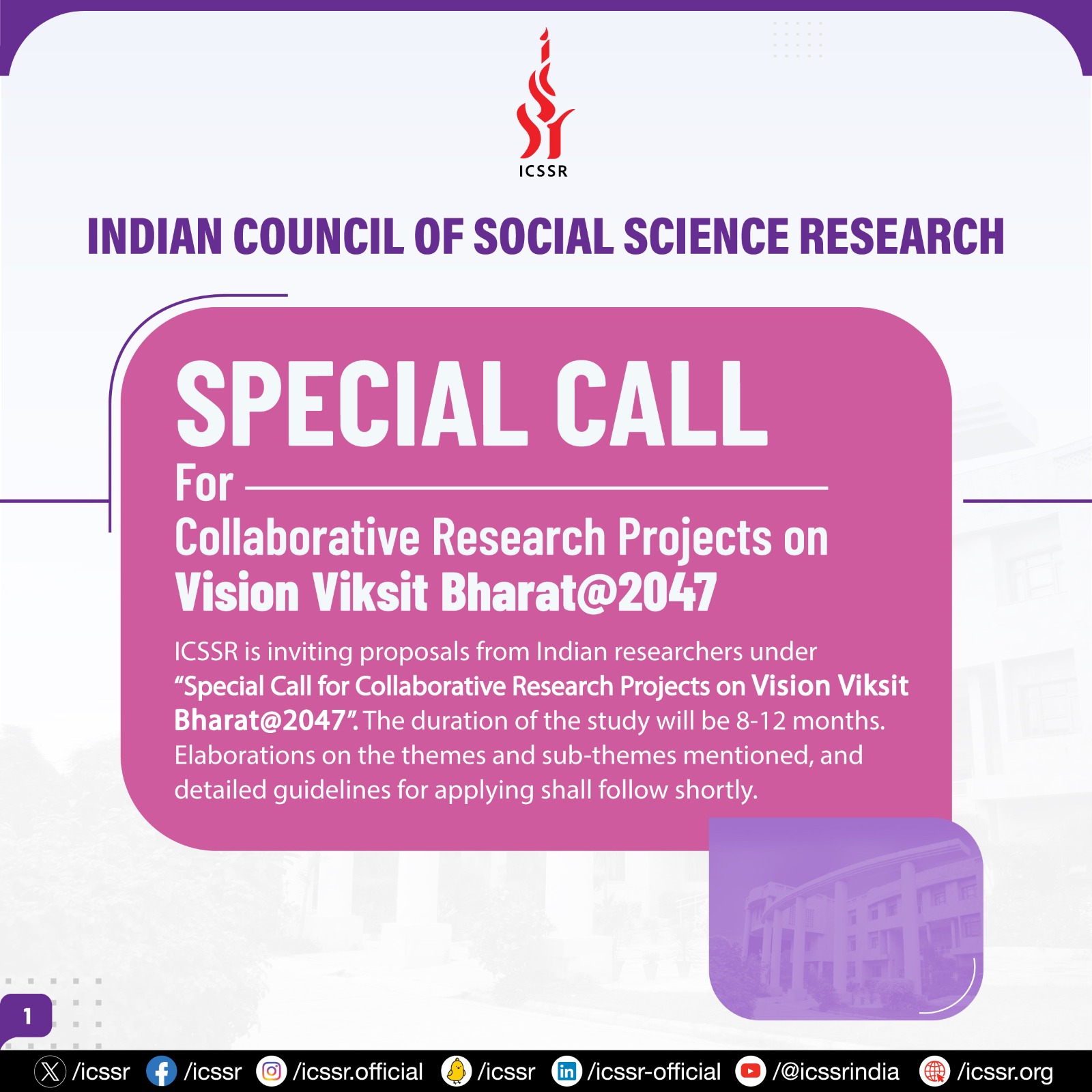
Call for 2023 Start-Up Research Project Collaborations
DataLab is accepting applications from UC Davis faculty and professional researchers for Start-Up Project Collaborations for the 2022-2023 academic year. These exploratory, or early phase, research collaborations pair domain area researchers with DataLab’s data scientists to gather data and/or perform preliminary exploration and hypothesis testing to make rapid progress on a data-driven domain research problem. We will begin reviewing proposals on November 21, 2022.
We are particularly interested in soliciting proposals that align with UC Davis’ Grand Challenges for rapid innovation in the following focal areas:
- Climate Crisis : Climate change is impacting our world in multifarious ways, from rising sea levels to more frequent and intense wildfires. Without innovative measures to reduce greenhouse gasses in our atmosphere and substantial modifications to how our society operates, additional negative impacts will accelerate. We must chart paths forward to mitigate existing impacts, cultivate innovative adaptations, and provide community resilience while simultaneously addressing historic inequalities and building equity into climate solutions.
- Emerging Health Threats : Human and animal health face new and evolving issues derived from, and impacting, our society and the environment. We do not exist in isolation. Society’s ill-prepared response to the COVID-19 pandemic has resulted in widespread suffering and loss, with disproportionate impacts on the most vulnerable populations. This tragedy is a clarion call to action for the entire world – to act now to prevent emerging health threats, of all kinds, from defining our future.
- Reimagining the Land Grant University: Land grant universities , including UC Davis, were created in the 1800s to meet a growing demand for agricultural and technical education, but at a terrible cost. The U.S. took nearly 11 million acres of land from approximately 250 tribes, bands, and communities to create these institutions. We must address the harmful origins and complex aims of our land grant university, forge meaningful and mutually beneficial relationships with Native nations, break down disciplinary silos, and develop models of positive public impact and equity for others to follow.
- Sustainable Food Systems : The modern food system destroys more health, social, environmental, and economic value than it creates. Changes to our food and agricultural systems are needed to reduce hunger, protect managed and natural ecosystems, build climate resilience, and improve health and the quality of life for people around the world.
We also strongly encourage proposals for projects that directly or indirectly impact social and environmental justice issues.
This program represents a significant investment from DataLab to support UC Davis researchers who have ideas for data intensive projects but lack the technical and data science expertise to carry out the research. Specific aims of this exploratory work generally focus on honing or determining the validity of proposed research question(s) relative to the available data, assessing potential approaches and piloting solutions, and/or producing preliminary results suitable for the development of successful proposals for multi-year, collaborative, externally funded research.
FOCUS, DURATION AND SCOPE OF PROJECTS
Projects can be at any stage of the research pipeline for the given research question (data gathering, cleaning, management, analysis, visualization, interpretation, dissemination, preservation) and feature any type of data (e.g., numeric, text, image, audio, etc.). Prior projects have included, but are not limited to:
- modeling and data exploration;
- visualization, including large-scale 3D/virtual reality;
- text analysis and natural language processing;
- network analyses;
- image classification;
- informatics.
Products from Start-Up Projects are exploratory in nature and additional work may be necessary for publication and production-ready products. Accepted projects will be scoped to include statements of work and project deliverables that can be successfully achieved within 8-12 weeks from the start of work. Examples of prior projects can be found on DataLab’s research project pages.
Proposals will be evaluated and selected in late fall 2022, with initial scoping and planning meetings in December through January 2023. Project work will begin in either winter or spring 2023. Start-Up Projects selected to begin in spring 2023 will also leverage participation from student interns enrolled in our honors data science series.
WHAT RESEARCHERS RECEIVE AS PART OF THE AWARD
- Regular consultation with the DataLab directorate;
- Technical project management by DataLab staff;
- 20%+ time of dedicated DataLab staff data scientist time to work on the project;
- Customized training opportunities for partnering groups on an as needed basis;
- Access to DataLab compute infrastructure as necessary and suitable for completion of the project;
- Up to $1,500 dollars as needed in fees for licensing data required to complete the proposed project;
- All project PIs are invited to become DataLab Affiliates;
- Access to DataLab physical facilities in Shields Library for team meetings.
- Engagement with the broader Grand Challenges community at UC Davis, potentially including networking and large scale proposal development support.
EXPECTATIONS OF PARTICIPATING RESEARCHERS
- Participation in weekly project meetings (typically virtual but in person also possible);
- Ability to dedicate focused time towards the completion of the proposed project during the identified time period;
- Availability to DataLab staff and directorship for communications (phone, email, Zoom, etc.) required to keep project moving forward successfully between project meetings;
- Review and contributions to the final project report and documentation;
- Present research at a DataLab hosted event (timing to be mutually determined);
- Participation in a DataLab networking event;
- Provide attribution to DataLab in any resulting products from the collaboration;
- Actively seek out, co-write and co-PI suitable follow-up applications for external funding to expand and continue the research. (Expectation is that domain researchers would be the primary PI on a domain-focused grant, whereas DataLab would lead on a technical or data science-focused grant.)
WHO CAN APPLY
Any principal investigators (PIs) from any department at UC Davis and UC Davis Health are eligible to apply. Postdoctoral scholars and advanced graduate students seeking support for a project may write a proposal but require support and engagement from their faculty mentor as the primary PI. Proposed projects cannot be a stand alone chapter of a students’ thesis or dissertation.
EVALUATION OF PROPOSALS
All proposals will be evaluated by an external review committee consisting of representatives from DataLab’s directorate, faculty advisory board, and affiliate community. Priority will be given to projects that the committee deems: (a) have the highest potential for impact; (b) most likely to lead to larger, externally funded research efforts; and (c) most technologically feasible within the scope and resources of the Start-Up program.
APPLICATION PROCESS
Applicants should submit a narrative proposal of approximately 2-3 pages (but no more than 5 pages) that includes the following:
- A description of the basic research question/hypothesis for the proposed project;
- Brief discussion of what, if any, approaches you have tried and why you need data science support;
- any known issues with data access, copyright, or required licensing fees;
- a statement to the effect of whether you “own” the data (do you have permission to share and distribute the data?);
- a real or pseudo sample of the data (not counted as part of proposal page limit);
- A description of how the project fits within your larger research goals and agenda;
- A discussion of the potential impact of findings on your research domain and which focal area(s) of Grand Challenges it aligns with;
- A list of known funding programs and/or sources which would be targeted for funding follow-up research;
- CVs of all PIs and primary project participants (2-page biosketch preferred) and a list (with email contacts) of all members of the domain project team including any postdocs, graduate students, undergraduate students, staff or other human resources who will directly participate in the project (not counted as part of proposal page limit).
Submit applications for the 2023 application cycle via email to DataLab with the subject “Start-Up Project Application 2023” by November 21, 2022. Applications will be reviewed as received, with projects selected and initial scoping and planning meetings held in December through January 2023. Projects will be assigned to either winter or spring quarter, with all project work completed by the end of June 2023.
Contact [email protected]. We can schedule a consultation to talk about your proposal or we are also available during our weekly office hours (Wednesdays 1-2:30 PM) .
Related Posts

news & announcements

The Ladders to Cures (L2C) Accelerator is an ambitious new initiative whose mission is to catalyze progress across the research ecosystem and accelerate advances leading to treatments and cures for patients with rare genetic diseases.
To fulfill our mission, we aim to develop and deploy scalable technologies to investigate disease mechanisms and to accelerate the development of therapeutic strategies. We are particularly interested in discovering shared “nodal” mechanisms between many rare – or rare and common – genetic diseases to accelerate our ability to develop targeted, precision therapies.
This is our first open call for transformative new ideas that will advance our mission. Selected projects will join the L2C Accelerator ecosystem and gain access to seed funding and scientific advisors with extensive experience in both industry and academia, to help advance therapeutic hypotheses from the lab to the clinic. Technology development projects that can be applied to rare disease discovery/therapeutics are also encouraged.
Ladders to Cures Accelerator Goals
We are focused on developing a deep mechanistic understanding of genetically-defined rare diseases. This may take many forms including:
- Given a group of causal genes/variants, what is the disease mechanism?
- Given a defined mechanism, can we establish a proof-of-concept therapeutic hypothesis?
- Given a proof-of-concept therapy, can we develop a path to the clinic?
Successful L2C projects will interrogate multiple genes of interest in parallel, aiming to uncover shared, convergent or “nodal” mechanistic insights and potential therapies.
Proposers are encouraged to discuss plans for partnerships with patient organizations, and where appropriate, to outline the essential data that will be required to facilitate clinical development (i.e. status of patient registries, natural history studies, biomarkers, etc.).
Eligibility
We are encouraging ideas from all members of the Broad scientific community in partnership with collaborators across the Boston ecosystem and beyond. The only requirement is that one member of the team is a Broad Principal Investigator. You are welcome to bring in collaborators from anywhere, including patient groups and organizations. All Broadies with PI status are encouraged to submit their ideas. Scientists affiliated with the Broad but lacking standing-PI rights can easily apply for case-by-case PI rights for a particular L2C project - please reach out to [email protected] if you are unsure of your status or need assistance acquiring case-by-case PI rights.
How to submit your project idea
Applicants are encouraged to discuss potential Ladders to Cures project ideas with Jillian Shaw (Scientific Advisor to L2C) at least two weeks prior to submission.
Seeking input from colleagues and platform or program leads is encouraged, but please note that letters of support are not required.
Project ideas will be evaluated by a committee composed of L2C steering committee members and L2C advisors with extensive experience in both academia and industry.
Successful teams will be required to showcase their work in an upcoming L2C Symposium!
Please email your project idea by Friday, June 30, 2024 to [email protected] as one merged PDF that includes the following sections:
Project Title
Principal Investigator(s) Please include a preferred email address for the Lead PI. At least two PIs are required.
Impact Statement How will this project make a difference? Please describe in 3-5 sentences the impact this project will have on advancing a therapeutic hypothesis for genetically-defined rare diseases.
Project Idea Please develop your project idea by answering the following questions in no more than 2 pages. Specifically, please comment on the scalable capabilities you need to deploy or build to make progress toward multiple genes of interest driving rare genetic disease(s).
- the challenge – what obstacle are you attempting to overcome?
- the stakeholders – what patient populations would be directly impacted by your research? What are the specific genes of interest you intend to interrogate?
- the solution – how do you anticipate leveraging high-throughput, scalable, cross-cutting technology to advance our mechanistic understanding of and possible therapeutic approach to your disease(s) of interest?
Project Team Please list the collaborators and expertise required to bring your idea to fruition.
Patient Foundation(s) and Patient Advocate(s) Where appropriate, successful L2C projects will partner with patient stakeholders.
Broader Community Expertise and Input Please seek feedback and guidance from the broader scientific community, e.g. Broad platform leaders, prior to submission. Please list the colleagues/experts you consulted.
Broadies Login
- next René Salazar Speaker Series: "My journey of spinning off my PhD research into a startup" on 5/14
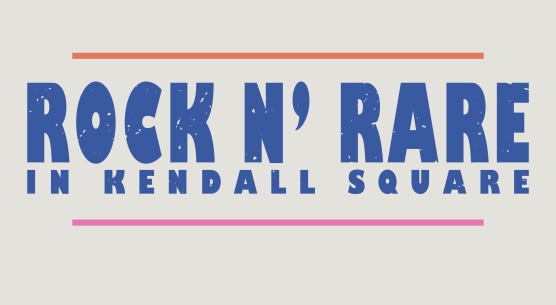
News at the broad

- About Administration
- Communication Lab
- Broad Style Guide
- Event Planning Guide
- Office of Inclusion, Diversity, Equity, and Allyship (IDEA)
- Office of Research Subject Protection
- Sponsored Research
- Africans, African-Americans, and Afro-Caribbeans@Broad
- Alliance Management@Broad
- Asian and Asian American@Broad
- Design Affinity Group
- LatinX@Broad
- Models, Inference & Algorithms
- Muslims@Broad
- Shades@Broad
- Sustainability@Broad
- Women@Broad
- Book a desk (Robin)
- Discovery Center
- Meetings and Events Calendar
- News and Announcements
- Broad Annual Retreat
Sandeep Kashyap
How to write a perfect project proposal in 2024?

Introduction
The primary purpose of writing a project proposal is to secure funding, gain approval, or secure resources from the most important stakeholders of a project.
For that, you need to explain the following in simple terms in a project proposal:
- What do you want to do and what are your goals for the project?
- How are you going to achieve your goals?
- How are stakeholders going to benefit from the project?
- What do you want from stakeholders?
- How are you going to use the money and resources granted by stakeholders?
In this post, we will learn about all these about writing a perfect project proposal in 2024. We will look at different types of project proposals, a project proposal template, and a real-world example of a project proposal.
What is a project proposal?
A project proposal is a project management document that outlines a project’s objectives, timeline, budget, goals, and requirements.
It is primarily written for stakeholders to secure funding, gain approval, and secure resources. However, other types of project proposals are also sent to win projects from clients.
A project manager should have a good understanding of the project and its key stakeholders for writing an effective project proposal. It is because a manager needs to get into the heads of the project’s stakeholders to understand what they expect from a project and write an effective project proposal accordingly to ensure buy-in for the project.
Benefits of writing a strong project proposal
Writing a strong project proposal offers a surprising number of benefits beyond simply securing funding or approval. Here are five key benefits of writing an effective project proposal:
- Clearly defines the project to increase the chances of success
- Makes it easy for stakeholders to mutually understand the project
- Ensures everyone involved is on the same page about goals, roles, and expectations
- Helps identify potential roadblocks early for proactive planning of solutions
- It can attract funding, and talent, and even serve as a marketing tool
Difference between a project proposal, a project charter, and a project plan
It is important to note that a project proposal is different from a project charter and project plan. Let’s understand the difference between these terms.
Project proposal vs. project charter
A project charter is a formal document that outlines the project’s goals, objectives , and resource requirements for a shared understanding of the team. It can’t be created until the project proposal is approved. Whereas a project proposal is written during the initiation phase.
Project proposal vs. project plan
A project plan is a detailed guide that provides step-by-step instructions for executing, monitoring, and managing the approved project. It is created during the planning stage after the project charter and project scope is defined. Whereas, a project proposal is a persuasive tool for securing project approval and resources.
Read more: Project management plan – everything you need to know about
Project proposal types
Project proposals are of six different types. Each has a different goal. A manager may have to write a project proposal for external and internal stakeholders to run a project successfully. Therefore, it is important to know about the different types of project proposals.
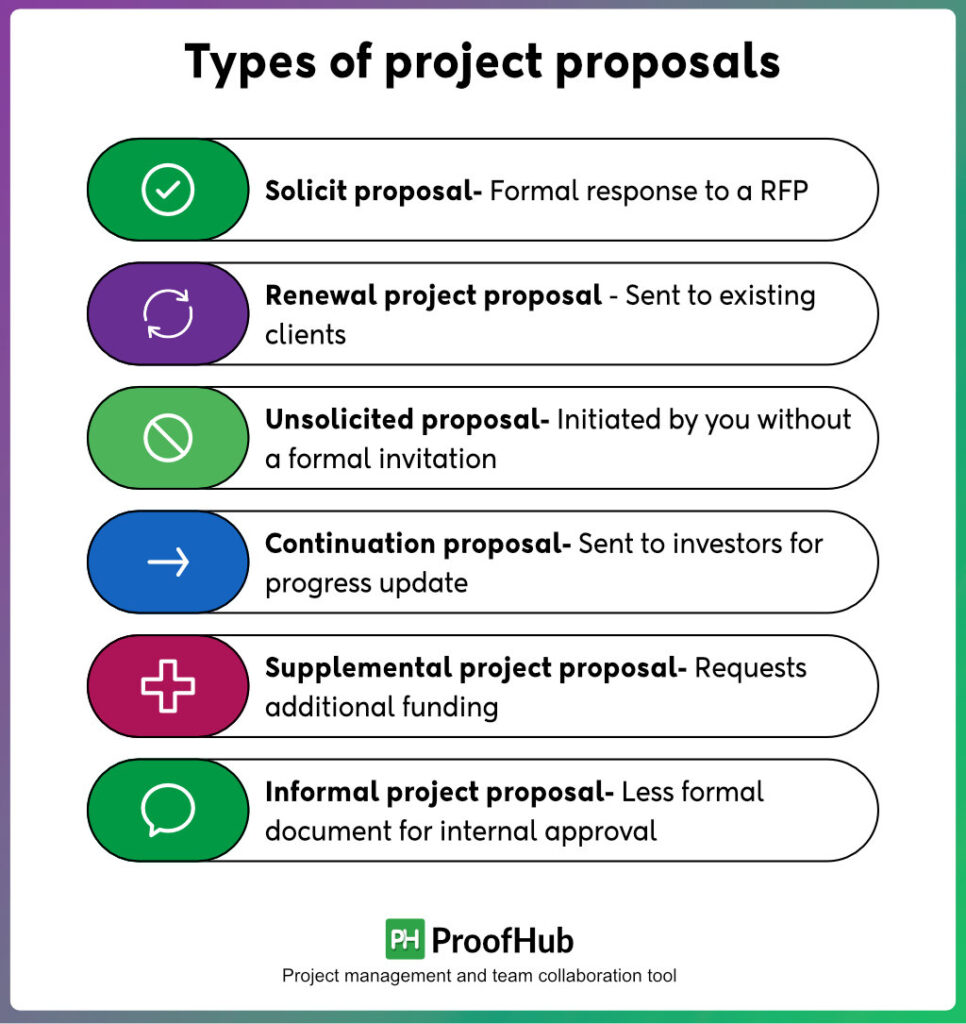
1. Solicited project proposal
A solicited project proposal is sent in response to a request for proposal (RFP). RFP is a document sent by a company to vendors to seek out resources required for a project. It includes the details of the scope of the work and the payment company pays for the resources.
RFP is sent to many vendors. Thus, while writing a solicited project proposal, you need to keep in mind that you may be competing against other vendors to secure a project. Thus, you need to keep your tone persuasive.
2. Unsolicited project proposal
This type of proposal is sent without having received a request for a proposal (RFP). A company has not sent a request for proposal to vendors but you know that the company is seeking resources from third-party vendors. You may or may not be competing against the other vendors in this type of proposal.
3. Informal project proposal
It is a type of project proposal that is created when a client makes an informal request for a project proposal from vendors. It means there is no formal RFP. Thus, the rules for writing a project proposal are less concrete. You can follow any format that can secure you a project.
4. Renewal project proposal
A project manager writes this type of proposal to existing clients to extend their services to the client. In this type of proposal, you focus on highlighting past achievements to secure a renewal for the future.
5. Continuation project proposal
The purpose of the continuation project proposal is to inform the client that the project is beginning and communicate the progress. You are not persuading the client with this type of proposal.
6. Supplemental project proposal
As the name suggests, this type of proposal is sent to the stakeholders who are already involved in a project to secure additional resources. The purpose is to convince the client to invest additional resources during the project execution phase.
How to write a winning project proposal?
You need to include certain elements in the project proposal to make sure it is good. Have a look at the steps to learn how to format a project proposal.
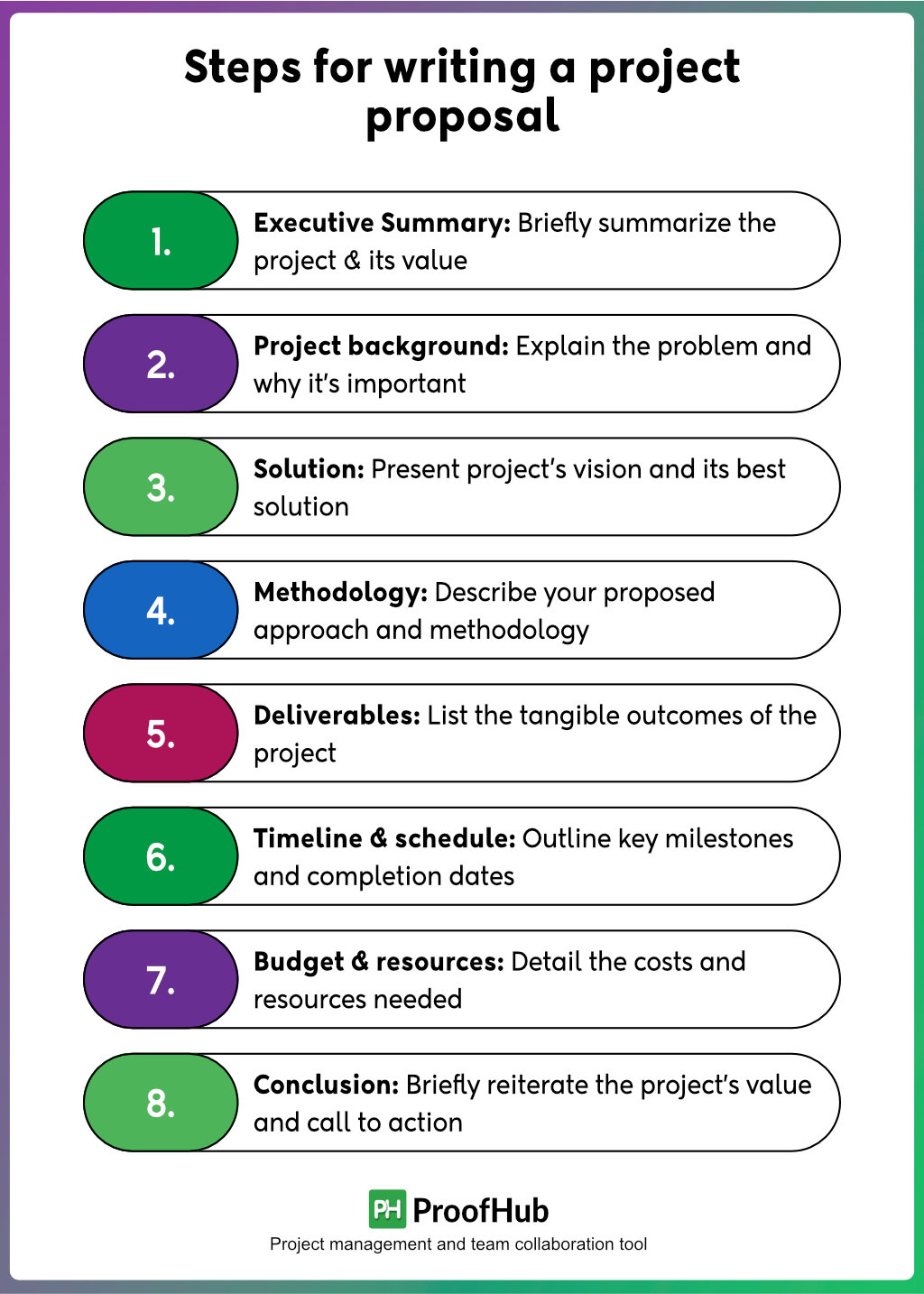
A. Pre-writing stage
The pre-writing stage is crucial for creating a compelling and successful project proposal. Here’s a breakdown of the key steps involved:
1. Understanding the audience
The first step is to identify decision-makers and understand the mindset of the audience for which you are writing a proposal. Thoroughly research the client’s needs, goals, and expectations. This includes understanding their industry, current challenges, and past projects.
Determine who will be reviewing and approving the proposal. This will help you adjust the tone, level of detail, and overall focus to cater to their expertise and interests. Tailor your proposal to directly address their specific concerns and priorities.
2. Project requirements gathering
To create an effective project proposal that has a higher chance of getting accepted, gather the project requirements. Usually, it is mentioned in the Request for Proposal (RFP) where specific requirements, evaluation criteria, submission deadlines, and any other instructions are provided.
If there is no RFP, schedule meetings or interviews with key stakeholders to gain a deeper understanding of the project requirements. This allows you to ask clarifying questions, gather feedback, and ensure your proposal aligns perfectly with their expectations.
3. Team brainstorming
Writing a project proposal is teamwork. Involve your team in brainstorming sessions to make a strong proposal. When a team is involved, it diversifies perspectives and expertise, leading to a more comprehensive and well-rounded proposal. Discuss the project goals, potential solutions, and resource needs with your team. Refine the proposal concept based on the collective knowledge and ensure everyone is aligned on the final approach.
B. Writing the proposal
1. start with writing an executive summary .
An executive summary is a concise overview of what a project is all about. It talks about the most important details or information of the project.
It primarily talks about the problem a project will solve, the solution a project will provide, and the benefits stakeholders will get from investing in this project.
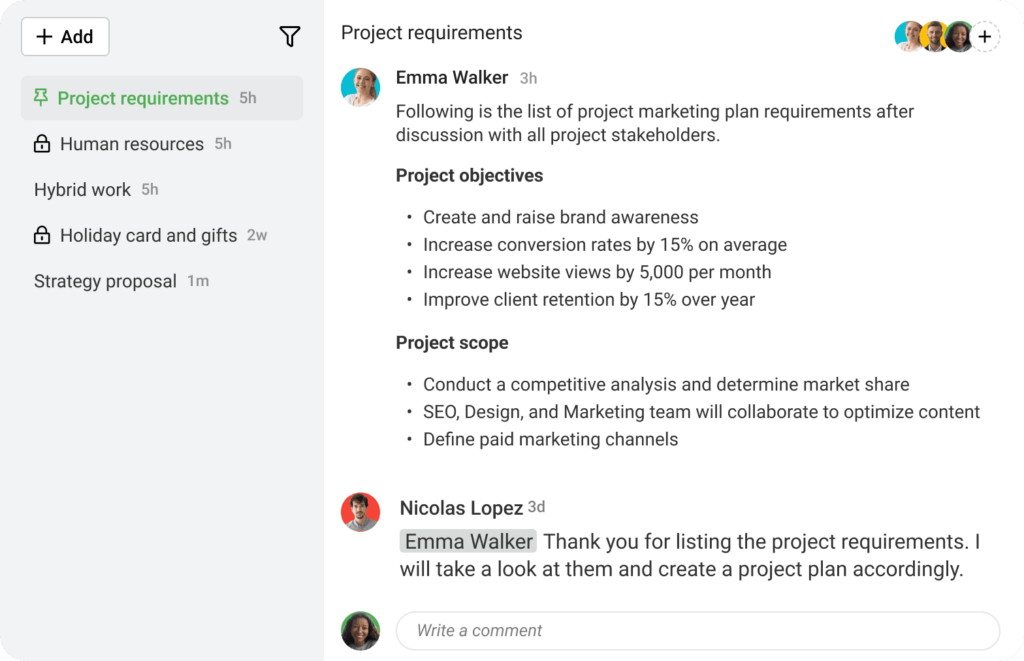
It is important to keep in mind to explain these items briefly as you are going to explain the problem and solution in detail later in your proposal.
The purpose of writing an executive summary is to pique the interest of the stakeholders in a project. It is like the elevator pitch of an entrepreneur whose purpose is to attract the stakeholders for further discussion.
2. Explain the problem in the project background
The project background is a one-page section that focuses on highlighting the opportunity by talking about the project problems you are going to solve. It talks about the problem and its history such as statistics, references, and start date.
It discusses what has been done so far to solve the problem by others or earlier projects. What is the current state of the problem, and how your project will focus on solving it?
This section indicates the opportunity and the next section of vision explains how you are going to seize the opportunity.
3. Project vision and solution
Project vision is the section where you present the solution to the problem. Vision statement defines your vision for the project, the solution you are going to work on, and how it will solve the problems.
This section tells what goals and objectives you are going to achieve from the project. Thus, it also acts as a north star or success criterion for your project.
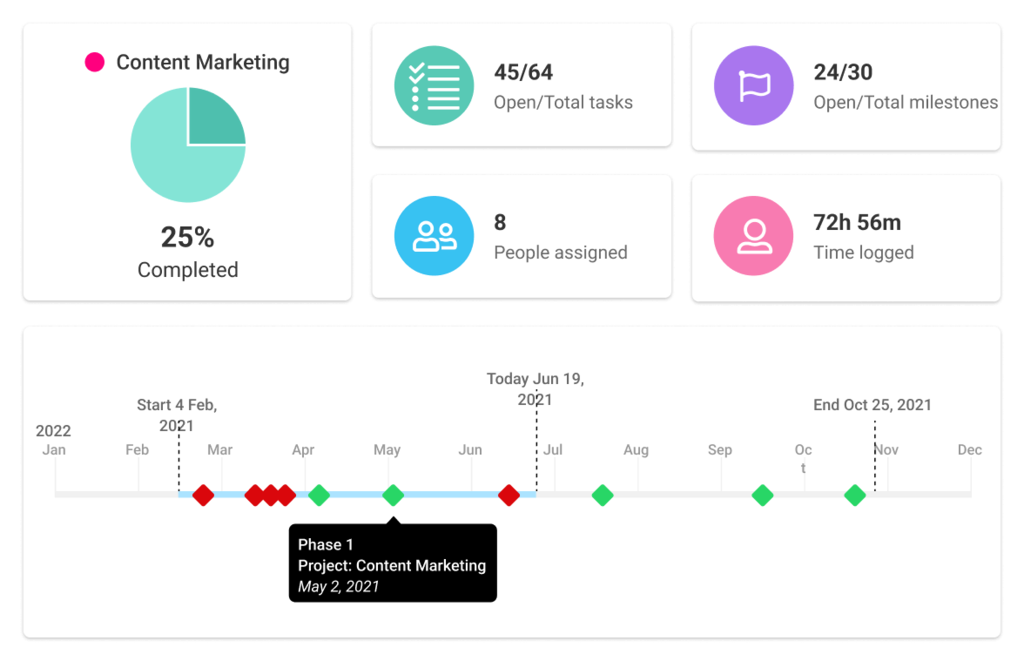
Now, stakeholders know what a project is all about; the problems, the solution, and the objectives. And they are interested to know how you will achieve the proposed objectives of a project.
The next sections of a project proposal talk about the project approach, scope, deliverables, milestones, budget, resources, and timeline.
Read more: Project objectives: learn how to write them for business growth
4. Project scope and deliverables
This section describes all the work items you need to work on a project. It involves breaking a large project into small tasks so that stakeholders can easily understand the project scope.
It also includes describing key milestones and project deliverables during the execution phase of your project life cycle.
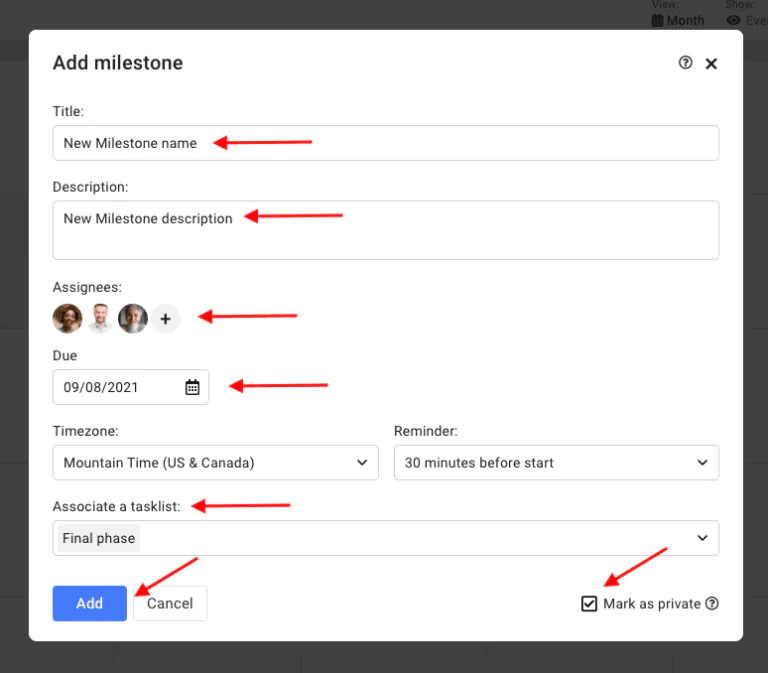
The purpose is to provide stakeholders with enough information to make decisions about funding and resources.
5. Project timeline
Project stakeholders have a clear idea about the scope of the project. But the very next question that comes to stakeholders’ minds is how much time a project will take to complete.
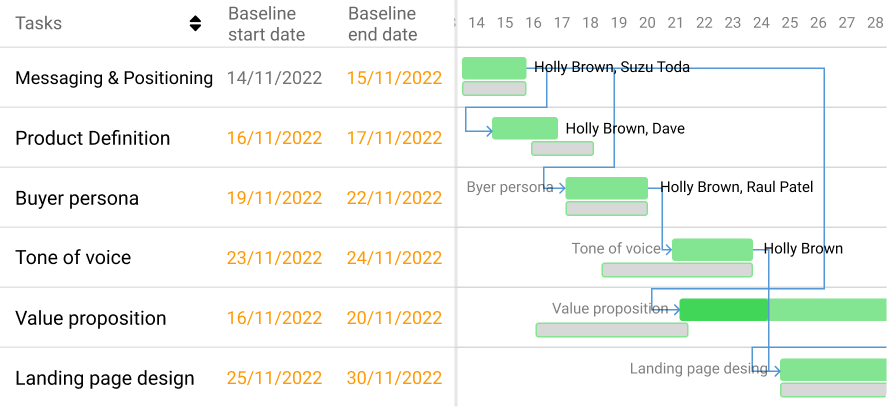
You need to propose an estimated timeline for the project describing when the key deliverables and milestones will be delivered and achieved.
6. Project methodology
With every project, the risks of cost, scope, time, and quality are associated. Thus, you need an effective project management approach to manage these risks.
In this section, you explain to stakeholders about the project approach you are going to use for project management . It includes defining project management methodology, tools, and governance for your project.
79% of teams worldwide use digital collaboration tools . The choice of your project management tool is going to influence how the project will be planned, executed, and managed and its potential risks are identified and mitigated successfully.
ProofHub is an all-in-one project management and team collaboration software that provides you with a centralized platform to collaborate with a team on a project proposal.
ProofHub strengthens your project proposal’s “Implementation Plan” by providing a platform to meticulously define tasks, assign roles, and track progress . Its work plan section allows for a detailed breakdown of the project with clear task dependencies and time estimates, visualized through a Gantt chart .
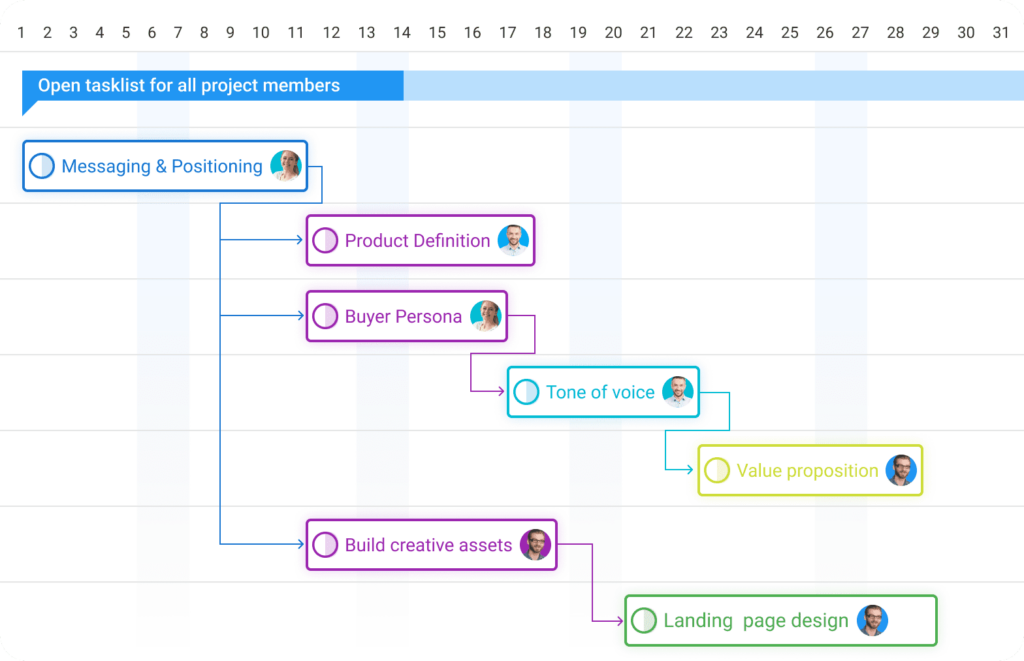
Team members can be assigned to specific tasks, ensuring accountability, while resource allocation demonstrates a well-planned approach.
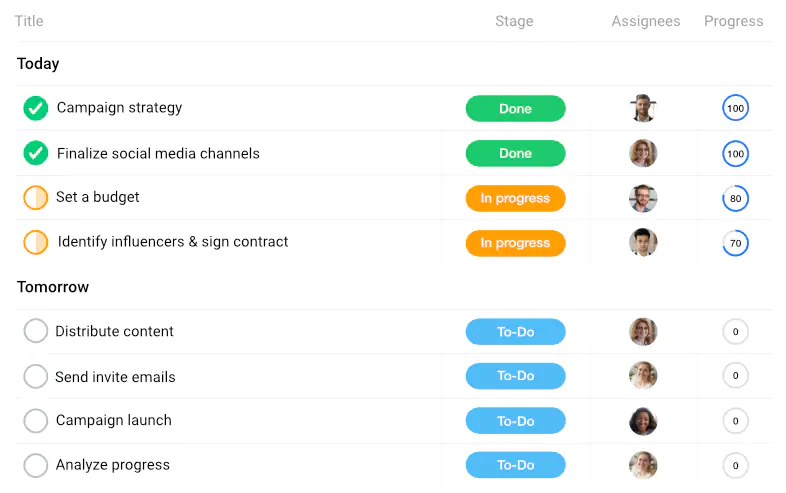
Real-time progress updates, collaborative discussions within tasks, and reporting capabilities showcase transparency and proactive management.
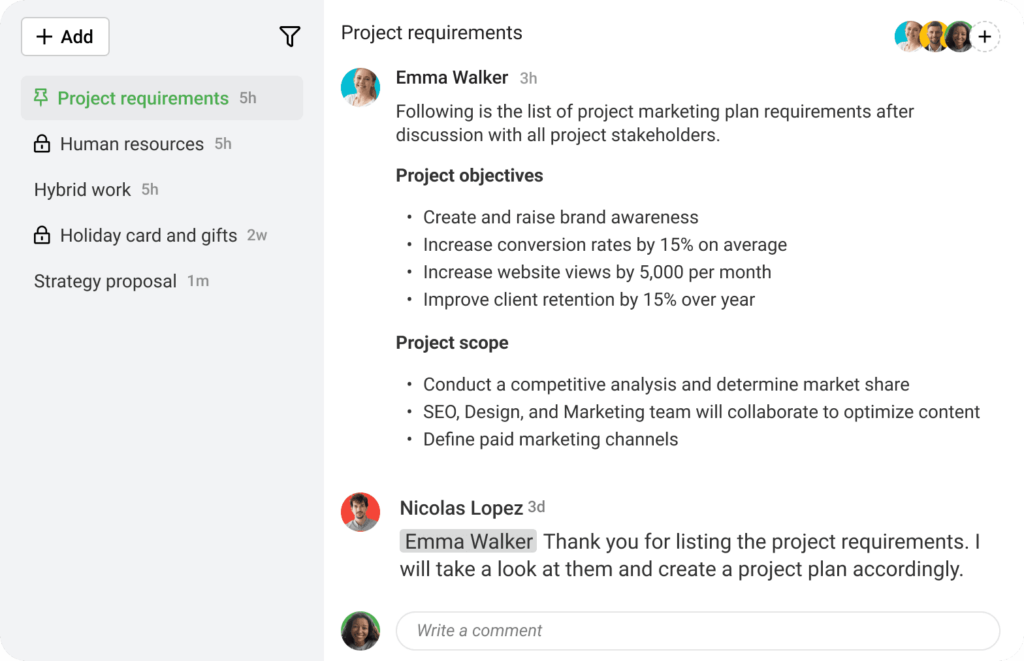
By incorporating ProofHub, your proposal presents a clear picture of efficient execution, giving the reader confidence in your ability to deliver the project successfully.
Learn more about ProofHub’s collaboration capabilities !
7. Project resource requirements
Project resource requirements talk about the resources you need to complete your project which includes materials, human resources, and technology. It is a key section that is crucial for the success of the project because every project needs resources to convert a plan into action.
This section of the project proposal briefly describes the project resources you need for the project and how you are going to utilize these resources.
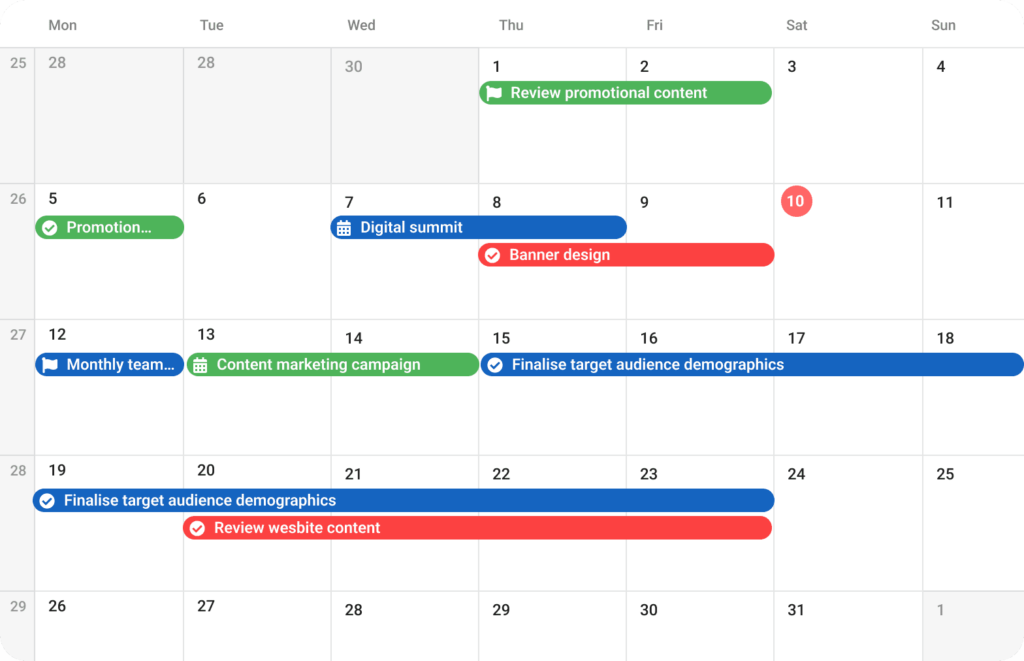
It does not explain the nitty gritty details of resource allocation. But, it gives a fair idea of why you need specific resources for your project and how these will be utilized.
Read more: 2024 guide to project resource management: processes, challenges & tools
8. Estimate project costs and budget
Project resources come at a price. Thus, in this section, you will define the project costs and create a project budget. It is the responsibility of a project manager to write this section in such a way that it covers all the project expenses.
At the same time, it also provides the opportunity for stakeholders to jump in and help you mitigate unexpected costs.
It also includes estimating project costs everything from the cost of project technology to team salaries and materials.
9. Closing statement
At this point of a project proposal, stakeholders have complete information about the project: scope, cost, time, objectives, and impact. You just have to briefly summarize the problem your project addresses and remind stakeholders about the benefits they will get from this project.
You can use cost-benefit analysis to demonstrate why your project is profitable. Thus, in this section, you wrap up your project proposal with a persuasive and confident conclusion to convince stakeholders to close the deal.
I hope these steps help you write a winning project proposal. Now, let’s have a look at some practical tips from experts to write a winning proposal.
Additional tips to write a perfect project proposal
Here are the five practical project proposal tips for writing a proposal:
- Clarity and conciseness: Do not use jargon or make your proposal overly complex. Keep it simple so that project sponsors can understand it easily.
- Strong value proposition: You want your project proposal to be accepted. Give strong emphasis on the benefits of your project and how it addresses the existing problems.
- Compelling visuals: Make your proposal compelling so that project sponsors read it. If it is not persuasive and visually interesting, project sponsors may not read it.
- Proofreading and editing: Do not make silly grammatical mistakes and fact check and proofread your proposal. Wherever required provide statistics to back your claims.
- Use collaboration tools: A project proposal involves explaining about project scope, cost, time, and resources. Use a project management tool like ProofHub to create a plan and collaborate with a team to create an effective project proposal.
Project proposal examples
A project proposal in project management is primarily sent to the stakeholders to secure funding, gain approvals, and request resources from stakeholders.
Here is a real-world example to get an idea of how to write a proposal for a project:
Project Proposal: Implementation of a CRM System to manage company customers, prospects, and leads
1. Executive
The Customer Success Manager at XYZ Corporation is proposing the implementation of a new Customer Relationship Management (CRM) system.
Currently, the company is using a legacy system that makes it difficult to manage data and ensure the alignment between the sales and marketing teams. It results in poor customer service to the customer and missed opportunities.
The new CRM system streamlines the company’s customer interactions, improves data management, and enhances overall customer satisfaction.
This results in enhanced customer relationships, improved operational efficiency, and increased business growth.
2. Background
- Lack of centralized data management system
- Lack of alignment between marketing and sales departments
- Not able to provide exceptional customer experience due to operational inefficiencies
3. Vision
- Implementing CRM to improve customer data management by centralizing all customer information into a single database
- Enhance communication and collaboration among sales, marketing, and customer service teams
- Increase customer satisfaction and retention through personalized and timely interaction
4. Project scope
- Researching and selecting a suitable CRM solution based on the specific needs and requirements of XYZ Corporation.
- Customizing the CRM system to align with the company’s business processes and workflows.
- Migrating existing customer data from legacy systems into the new CRM platform.
- Phase 1: Research and Selection (1 week)
- Phase 2: Customization and Configuration (2 weeks)
- Phase 3: Data Migration (1 week)
- Phase 4: Training and Adoption (2 weeks)
- Phase 5: Go-Live and Deployment (2 weeks)
5. Project management approach
Hybrid project management : Waterfall during the planning of each phase of the project and Agile during the implementation of the CRM.
6. Project resource and budget
The estimated budget for the CRM implementation project is $50,000, including software licensing fees, customization costs, training expenses, and implementation services.
7. Project risks and mitigation
- Potential resistance from employees toward adopting new technology
- Integration challenges with existing systems and applications:
Mitigation:
- Addressed through providing training sessions for employees to ensure hassle-free adoption of the CRM system.
- Managed through careful planning and coordination with IT vendors and stakeholders.
8. Conclusion
The implementation of a CRM system for XYZ Corporation enhances customer relationships, improves operational efficiency, and drives business growth. We seek approval from the executive management team to proceed with the implementation of the CRM system as outlined in this proposal.
Project management proposal template
Trying to manage a project without project management is like trying to play a football game without a game plan. – Karen Tate
A project management proposal template provides the framework and detailed proposal outlining to create a project proposal. It outlines the sections you need to include in a project proposal and the instructions in each section. By following the instructions in the template, you know how to make a project proposal, customized to your business needs.
Here is the project management proposal template:
1. Executive Summary
In this section, you will summarize the complete project proposal and add the most important details of the project.
Outline the following details in brief in the executive summary:
- Project background and vision
- Project goals and deliverables
- Project budget, timeframe, resource, and success criteria
2. Project Background
In this section, you will talk about the problem a project is going to solve or the business opportunity a project intends to grab. Explain it in-depth because it forms the basis of the project.
Here is what you need to include:
- Project history and stats of similar projects
- The basis upon which the project is created
3. Project vision
This section includes the project vision statement. You explain the solution to the project problem and define the goals of the project.
Here is what you need to do:
- Write a project vision
- Present a solution
- Write the SMART goals you want to achieve
4. Project plan
It includes multiple sections as below:
4.1 Project scope and deliverables
Project scope defines all the work you need to do to complete the project.
Project deliverable is something that is of the end-user or customer value.
4.2 Project timeline
Every project has a start and an end date. Similarly, there is a timeframe for each task and deliverable.
4.3 Project approach
Every project follows an approach to project management and uses project management tools. For example, construction projects follow the Waterfall methodology whereas software development projects follow the Agile methodology.
4.4 Project risks
A project risk is something that can impact the cost, time, and scope of the project.
List here all the project risks, likelihood, impact, mitigation plan, and risk owners in a table.
4.5 Project resource requirements
Project sponsors need to know about the details of the resources required to approve the budget for the Project Proposal.
Define the project resource requirements here in the table:
- Technology requirements
- Human resources requirements
- Material requirements
4.6 Project estimated cost and return on investment
A project sponsor wants to know the project costs and return on investments.
4.7 Project ownership and communication plan
This section includes the details of the key stakeholders of the project.
- Project sponsor: who owns the project
- Project customer: who the project is being delivered to
- Manager: who is responsible for managing the project and informing the status to stakeholders
5. Call to action
In this section, provide your contact details for the client to get in touch with any questions or allow the project sponsor to authorize the project if they are happy with the project proposal.
It is important to keep in mind the above-mentioned are the standard sections that are included in most project proposals. If you want to add some other elements to your project proposal, you can add the sections as per your needs to format a project proposal.
Create a winning project proposal with the right tool
A good project proposal convinces stakeholders why the project should be carried out. It should clearly describe project problems, project objectives, benefits for stakeholders, your requirements from stakeholders, and how you will utilize the secured resources. You need to have a good understanding of the project and project sponsors and stakeholders before writing a project proposal.
To create an effective project proposal, you need cross-collaboration between departments to gather key details and project management software to plan a project.
That’s where a feature-rich project management software, ProofHub, comes into play. It helps you with team collaboration and project planning for the project proposal. You can create a project plan using a Gantt chart , create tasks using task management software , and collaborate with the team using chat and a centralized file-sharing system .
Organize, manage, and collaborate seamlessly with ProofHub – All-in-one solution for projects, tasks, and teams
Related articles
- How to manage projects with a tool like ProofHub
- 10 Common project management challenges (and How to solve them)
- Project objectives: learn how to write them for business growth
- The 11 best project management software for your team
How long should a project proposal be?
A project proposal should not be too long. Ideally, a project proposal should take 1-2 pages but it also depends on the complexity of the project and the format you choose.
What section of a proposal presents a list of project costs?
Project costs are briefly covered in the Project Cost section. However, it depends on the template you choose. The detailed breakdown of the project costs is attached with the project proposal in the reference document.
What section of a proposal identifies the key issues and discusses the project goals?
Project background and project vision are the sections that talk about the key issues and project goals. However, it is explained in brief in the executive summary also.
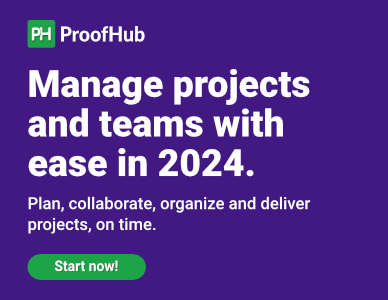
- Share on LinkedIn
- Email this Page
- Share on Facebook
- Share on WhatsApp
Try ProofHub, our powerful project management and team collaboration software, for free !
No per user fee. No credit card required. Cancel anytime.

The Global Partnership for Education (GPE) Knowledge and Innovation Exchange (KIX), a joint endeavor with Canada’s International Development Research Centre (IDRC), is pleased to announce a new funding opportunity.
This call is seeking proposals from individual organizations, or consortia of multiple organizations, to become implementing partners in the new GPE KIX Regional Observatories on Education System Resilience initiative.
The purpose of the initiative is to contribute to the improvement of education system resilience of GPE partner countries through research and evidence. The task of implementing partners will be to establish regional observatories, conduct applied research and mobilize its findings.
The call expects to fund six regional observatories: one in Latin America and the Caribbean (LAC), one in East, West, Central and Southern Africa, and four in Europe, Middle East and North Africa, Asia and the Pacific (EMAP).
The initiative follows on the GPE KIX COVID-19 Observatory project. Building on the insights of the original project and a recent scoping study conducted in preparation for the call, this new initiative focuses on:
- Examination of existing practices related to education system resilience in GPE partner countries
- Anticipation of future disruptions to education systems in GPE partner countries.
The deadline to submit proposals is July 11, 2024 .
Learn more and apply
Horizon Europe EU Missions: €123.97 million for projects under the Adaptation to Climate Change call
In support of the European Green Deal, the European Commission has launched a new call for project proposals to support research and innovation under the EU Mission "Adaptation to Climate Change"
Results of the EDF 2023 Calls for Proposals
Following the third calls for proposals under the European Defence Fund (EDF), 54 collaborative defence research and development projects with a total EU support of almost €1,031million are selected for funding..
Description
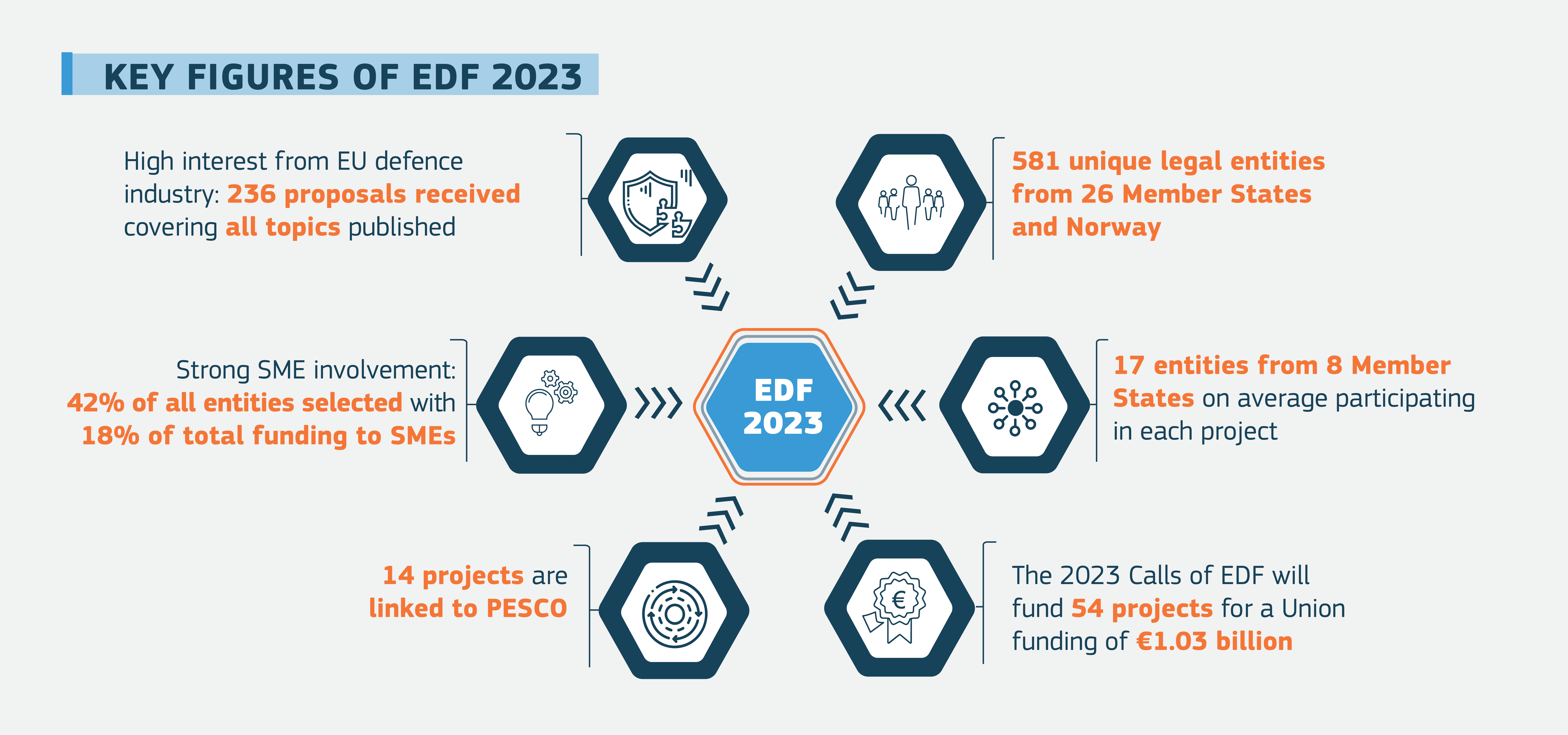
The selected projects will support technological superiority across wide range of defence capability domains, including cyber defence, ground, air and naval combat, protection of space-based assets or Chemical, Biological, Radiological and Nuclear (CBRN) defence.
Edf 2023 call results - general factsheet.
The Commission is intending to fund 54 additional EDF projects worth €1 billion, which will bring the total EU budgetary investments to more than €3 billion in collaborative defence R&D projects since the start of the EDF Regulation in May 2021. The selected proposals respond to the funding priorities of the 2023 EDF work programme, addressing 34 topics structured along four thematic calls for proposals, plus bottom-up calls focused on SMEs.
Selected Projects
Explanatory Note:
- This page contains the general overview factsheet of the results and the individual project factsheets . Please note that the individual project factsheets represent the proposals that will be invited to grant agreement preparation. These factsheets are for information purposes only and do not bind the Commission to any contractual agreement.
- The list of members in the project factsheets below are the beneficiaries of the projects . The overall participation statistics also include affiliated entities and named subcontractors. These are not named in the factsheet.
- Factsheet re-use policy: Re-use of the documents contained on this page is allowed, provided appropriate credit is given and any changes are indicated (Creative Commons Attribution 4.0 International license).
Share this page

IMAGES
VIDEO
COMMENTS
This Call for Proposals will be contributions of USD 50,000 to USD 250,000 and will have no specified/prioritized regional or country focus. Projects may have a global, thematic, regional, and/or country-specific focus. The maximum project duration is 36 months.
Calls for Papers. Economics of Artificial Intelligence: Political Economy Challenges (call closes June 1, 2024) Megafirms and the Economy (call closes June 15, 2024) Information and Competition in the Digital Economy (call closes July 1, 2024) Economics of Mobility (call closes July 18, 2024) Competition in the US Agricultural Sector (call ...
This call for proposals is the first step in an ambitious three-year project to develop an agenda for conducting ethical research into climate change and health. The call and associated commissioned and desk research will be followed by regional and global convenings to discuss findings and recommendations from the first stage, and the ...
Research proposal examples. Writing a research proposal can be quite challenging, but a good starting point could be to look at some examples. We've included a few for you below. Example research proposal #1: "A Conceptual Framework for Scheduling Constraint Management" Example research proposal #2: "Medical Students as Mediators of ...
Overview. In Fall 2021, the Social Science Research Council launched the Mercury Project, mobilizing social and behavioral scientists in a search for cost-effective and scalable solutions to build vaccination demand and healthier information environments. With $25M in funding from The Rockefeller Foundation, Robert Wood Johnson Foundation ...
Call for proposal under the NEW AND EMERGING ENERGY STORAGE TECHNOLOGIES (NEST) PROGRAMME: 08/04/2024: 07/06/2024: Call for proposal under Cognitive Science Research Initiative (CSRI) 16/04/2024: 31/05/2024: Call for Expression of Interest (EOI) for Impact Assessment of the Vigyan Jyoti Programme: 10/05/2024: 31/05/2024: Archive Call For Proposals.
Applications and Enquiries. Enquiries and proposals were submitted electronically in Word format to [email protected] by 29 April 2022 (23.59 GMT). All applicants should have received a confirmation email upon receipt of their proposal. This is a Call For Research Project Proposals 2022 on contemporary Greece and Cyprus.
Through calls for research proposals, we fund projects that aim to foster climate-resilient food systems, global health, education and science, democratic and inclusive governance, and sustainable and inclusive economies in developing countries. Gender equality and inclusion are also central to our strategy and the research we support.
Call for Proposals. Call For Papers | Call For Proposals | Submission |. ERIA invites the submission of research proposals to join its research projects across sectors. All calls for proposals will be posted in our website and announced through our social media accounts. Research. Call for proposals.
Call for research proposals. The Hinrich Foundation supports trade research projects that advance the understanding of global trade issues and support policy development. The Foundation's international trade research program promotes research across trade-related sectors, particularly related - in no order of preference - to sustainable ...
Abstract: This is a brief (300-500 words) summary that includes the research question, your rationale for the study, and any applicable hypothesis. You should also include a brief description of your methodology, including procedures, samples, instruments, etc. Introduction: The opening paragraph of your research proposal is, perhaps, the most ...
Accepted proposals will be included within a 3-year project that is linking academic research to the work of a global civil society coalition working on policy reform. Through this project, researchers will receive sustained opportunities for collaboration and presentation, publication, an honorarium and possibility of coverage of some ...
Each consortium must include a minimum of three project partners: one from Japan and two from two European countries participating in the call. Applicants have until 23 July to submit proposals. More details here. Editor's note: The Funding Radar is a weekly roundup of the most relevant research funding calls.
Open calls for proposal related to research and innovation can be found on the websites of the 5 individual funding programmes: European regional development fund (ERDF) ... The Research Fund for Coal and Steel supports research projects in coal and steel sectors. Every year around €55 million (€47.7 million for 2015) is made available to ...
Call for Proposals. The Center for Bioplastics and Biocomposites (CB 2) has announced a call for proposals for research projects to begin in 2024. Proposal topics from Industry Advisory Board will be released to faculty on July 12, 2023. Proposal applications due August 11, 2023.
4. Call for Expression of Interest (EoI) under the PAMC-Technology [Last Date: 1 May 2024] Details. 5. IGSTC 2+2 call 2024 [International] [Last Date: 16 May 2024] Details. 6. BIRAC announces National Call for proposal under BIONEST scheme [National] [Last Date: 31 March 2024] Details.
04/25/2024. 10. Pre-announcement of the 1stCo-funded Call for Transnational Collaborative Research Projects: "Supporting the Future of Animal Health and Welfare". French National Research Agency (ANR) 04/25/2024. 11. Call for proposal under Cognitive Science Research Initiative (CSRI) Department Of Science & Technology (DST) 04/19/2024.
Call For Papers | Call For Proposals | Submission |. ERIA invites the submission of research proposals to join its research projects across sectors. All calls for proposals will be posted in our website and announced through our social media accounts. Research. Call for proposals.
Call For Proposals. Title. Currently content not available. Department of Biotechnology, an attached office of the Ministry of Science and Technology, Government of India, Biotechnology is a frontline area of science with immense potential for the benefit of the human kind.
Call for Proposals Last Date Remarks File ; Ashoka University-IITD : Call for ASHOKA-IITD joint collaborative research project proposals 2021 : 31/05/2021 - View/Download: SPMCIL : Anti-Counterfeit Codes based on Optically Variable Ink for Smartphone camera based identification of fake Indian Currency Notes ...
iii. Proposals that exceed 3,500 words count will be rejected automatically. iv. All submitted proposal should meet AERC's requirements (click here to see the details). This is an open call, so there is not deadline. Click here to login/register on the AERC Research Management System (RMS) to submit your proposal
Pilot Project anticipated funding is $50,000 in direct costs for a single year. Special consideration will be given to proposals that consist of collaborative teams combining engineering and the biomolecular sciences, with an additional $25k available to such transdisciplinary teams (for a total of $75k/yr).
In continuation to the announcement made on the ICSSR website dated 11 March 2024, the guidelines entailing details of framework of the research, duration of the project, eligibility criteria, how to apply, budget and value, remuneration and emoluments of project staff, joining and release of grants, monitoring of research study and other conditions can be accessed by clicking on the link ...
Proposals will be evaluated and selected in late fall 2022, with initial scoping and planning meetings in December through January 2023. Project work will begin in either winter or spring 2023. Start-Up Projects selected to begin in spring 2023 will also leverage participation from student interns enrolled in our honors data science series.
Call for proposals. Sr. No. Title. Last date. Link to apply. Document. 1. EoI for joint collaboration in R&D, manufacturing, and commercialization of broad specificity Salmonella vaccine useful against typhoid and paratyphoid fever and Salmonella Typhimurium gastroenteritis. 12/07/2024.
The Ladders to Cures (L2C) Accelerator is an ambitious new initiative whose mission is to catalyze progress across the research ecosystem and accelerate advances leading to treatments and cures for patients with rare genetic diseases. Submit your project proposals by Friday, June 30.
Here are the five practical project proposal tips for writing a proposal: ... Project timeline. Phase 1: Research and Selection (1 week) Phase 2: Customization and Configuration (2 weeks) Phase 3: Data Migration (1 week) ... Call to action . In this section, provide your contact details for the client to get in touch with any questions or allow ...
The initiative follows on the GPE KIX COVID-19 Observatory project. Building on the insights of the original project and a recent scoping study conducted in preparation for the call, this new initiative focuses on: Examination of existing practices related to education system resilience in GPE partner countries
The total indicative budget available is EUR 123.97 million. The deadline for submissions is 18 September 2024. The call covers nine topics: HORIZON-MISS-2024-CLIMA-01-01 Bringing available and actionable solutions for climate adaptation to the knowledge of the regions and local authorities.; HORIZON-MISS-2024-CLIMA-01-02 Bringing together the national level with the engaged regional and local ...
EDF 2023 Call Results - General Factsheet. The Commission is intending to fund 54 additional EDF projects worth €1 billion, which will bring the total EU budgetary investments to more than €3 billion in collaborative defence R&D projects since the start of the EDF Regulation in May 2021. The selected proposals respond to the funding ...